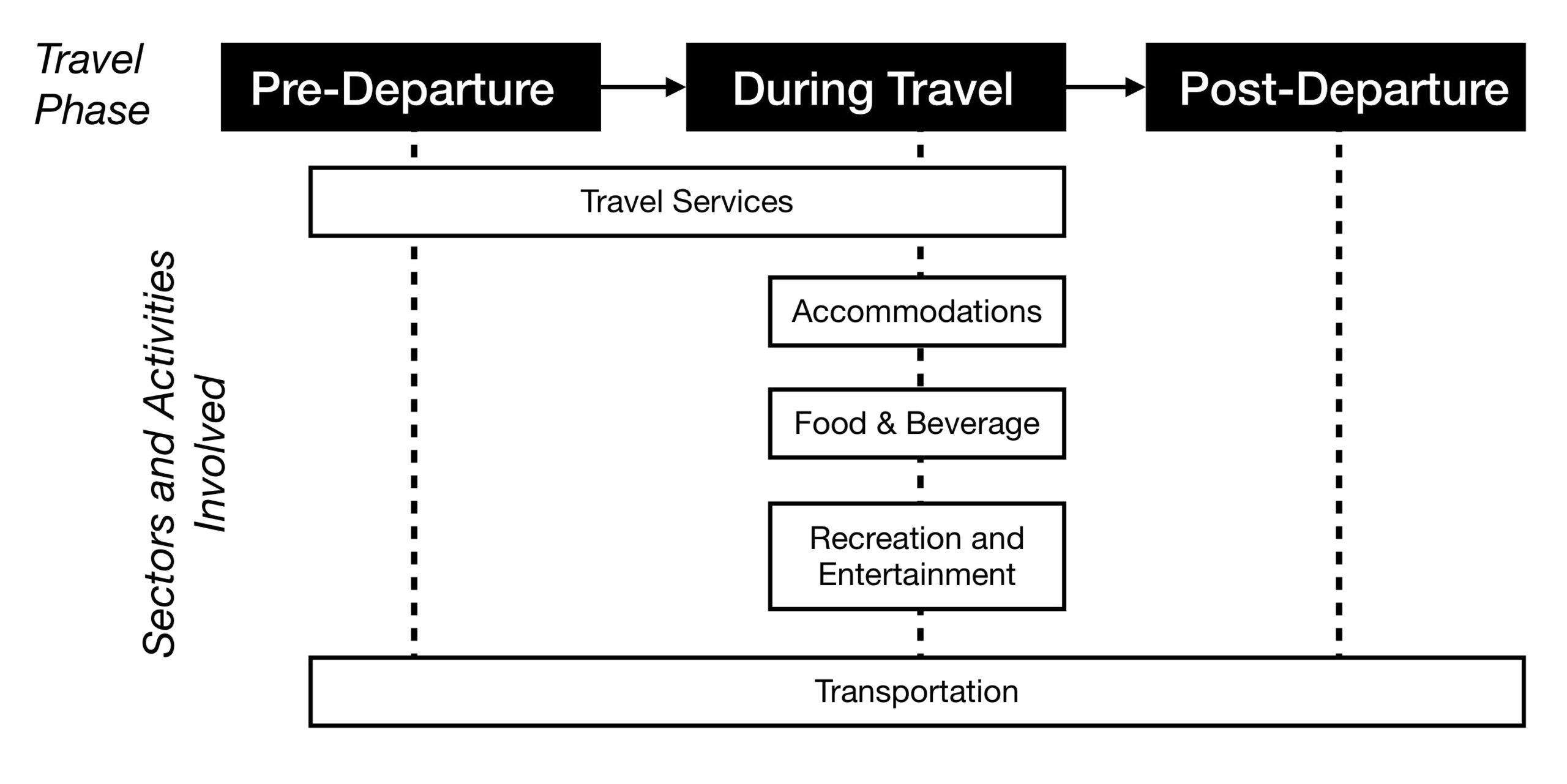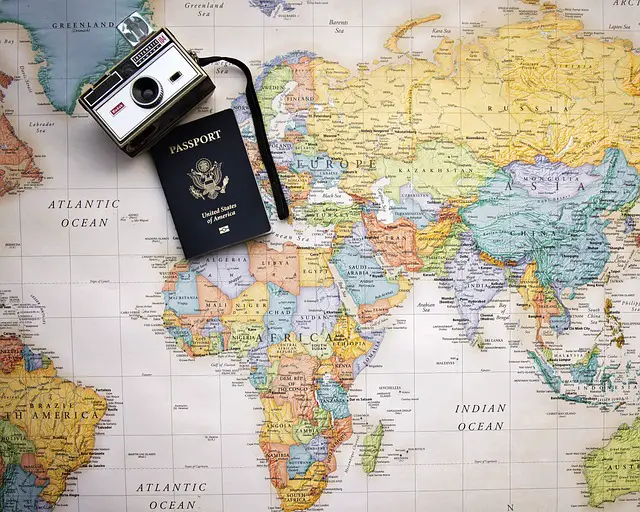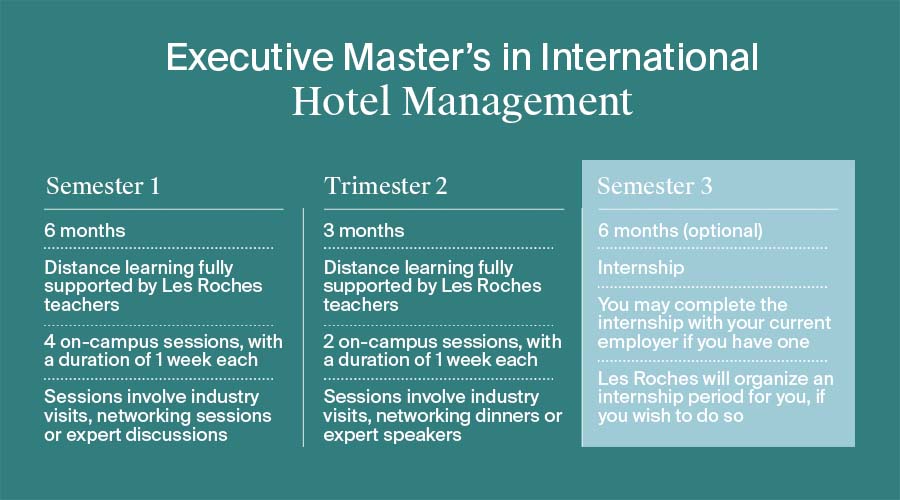
- German Soccer Sensation Finds a Home with the Bobcats
- From Air Force Veteran to the Middle of the Atlantic
- Career Assistance 44 Years After Graduation
- Admissions by Day. Filmmaking by Night.
- Admissions Process
- Alumni Updates
- Bryant & Stratton College News
- Business Degrees
- Career Services
- College Life
- Continuing Education
- Criminal Justice Studies
- Degree Insights
- Education Programs
- Financial Aid
- Healthcare Degrees
- Human Resources
- Military Relations
- Online Education
- Social Media
- Student Services
- Technology & Design
- Video Posts


Tourism vs. Hospitality - Decoding the Differences
Bryant & Stratton College Blog Staff

The hospitality and tourism industries are closely connected, but they are not the same thing. Though both connect to travel and leisure, these two industries have distinct differences that need to be understood if you are considering a degree or career in the field. By knowing how they are different, you can choose the right degree that will help you achieve your desired career path.
What is the Difference Between Tourism and Hospitality?
Hospitality is a field that focuses on providing accommodations to visitors at hospitality-related industries, such as hotels, motels, restaurants, cruise ships, country clubs, casinos, and convention centers, while tourism is focused on providing quality attractions and events in order to entice tourists to come.
For each of these fields to be successful, they focus on specific ways to keep people satisfied so they will return. Hospitality businesses must build strong relationships with their guests to not only prevent them from going to a competitor, but to keep them coming back. Many tourism businesses are classified as hospitality businesses as they must also have meaningful relationships, but they are more focused on traveling activities that may include heavy planning and marketing.
What are the Similarities Between Tourism and Hospitality?
Both the hospitality and tourism industries focus on serving people when they travel. These are highly competitive and always-changing fields that require people to be able to adapt to a changing market and work environment. Both tourism and hospitality professionals need to be good marketers to draw potential clients and customers to their industries.
What Jobs are there in the Travel and Tourism Industry?
The travel and tourism industry focuses on helping people plan and execute their travel arrangements. Some jobs in tourism management include:
Travel Agent
A travel agent is a great career path for people who majored in tourism. Travel agents work with their clients to plan their trips, so they must be highly organized and have a knowledge of the travel industry so they can book resorts, cruise ships, airline travel, and more for their clients.
Travel agents also assist clients with their travel budgets by calculating travel costs and helping clients choose trips and adventures that fit within their budget. They also can assist clients with getting their passports or other paperwork in order so they can legally travel.
The pay for a travel agent varies because they often earn commissions based on the trips and services they book, as well as the setting they work in. Travel agents can work independently or work with a travel agency, depending on the demand in their area.
Flight Attendant
A flight attendant works in an airline to help travelers get to their destination safely and comfortably. While travelers often see the simple work of the flight attendant, such as passing out snacks and collecting garbage, flight attendants are also trained on how to help protect passenger safety if something goes wrong.
Flight attendants need to be good at working with people, even those who are not in a good mood or who face frustration when they travel. One of the main benefits of this profession is getting to travel to and explore many destinations around the world.
The Bureau of Labor Statistics estimates that the demand for flight attendants will increase by 17% from 2019 to 2029, so it is a great time to pursue this career path.
What Jobs Are There in the Hospitality Industry?
Jobs within hotels, restaurants, and event centers tend to fall in the hospitality industry category. Hotel managers, event managers, hotel clerks, bar managers, and chefs are just a few examples in this industry, with details as follows:
Hotel Manager
A hotel manager makes sure that guests are comfortable during their stay in a hotel or resort. They may have to arrange for blankets or other amenities to be taken to hotel rooms, oversee the employees of the hotel, and ensure that supplies, like soap and shampoo, are ordered in a timely manner. On a resort property, the hotel manager may also be in charge of entertainment. The exact setting or location will dictate exact duties and responsibilities for this role. Overall, it is the manager's job to handle customer service needs that pop up during a guest's stay.
Event Manager
An event manager or event planner helps plan large events to ensure all attendees enjoy the experience. These individuals, like others in the hospitality industry, need to be highly organized. Event managers will plan all of the details, gather bids from venues and vendors, coordinate transportation for attendees, arrange for food, and even connect with local hotels to ensure people have a place to stay. They help their clients manage and maximize their budgets and ensure that everything is ready when the special event starts.
The BLS estimates that this career will grow 8% from 2019-2029, which is much faster than average. Approximately 10,800 new jobs will be created in this field, so it is a great time to consider pursuing a position in event management.
A concierge is employed by a resort or event center to help guests book entertainment and enjoy their stay more fully. These professionals need to know their local area well so they can connect guests to the entertainment options that best fit their tastes and desires for their trip.
Concierge professionals tend to be employed by high-end resorts and luxury hotels. Distinguished guests expect to have someone to help them book their services and are willing to tip well for this service.
Restaurant and Catering Professionals
The hospitality industry is also the industry that covers restaurants and catering services. While those interested in opening a restaurant or catering business will also need to explore foodservice training, training in hospitality will help them understand the customer service side of this industry. These professionals can work anywhere where food and beverage are prepared and served, including hotels, resorts, and restaurants.
Start Your Hospitality or Tourism Journey Today!
If the tourism and hospitality industries are appealing to you, then finding a career in these fields or industry may require further education. Bryant & Stratton College has a number of hospitality degree programs , including associate degrees and diplomas, that can help you get started in this field. Reach out to the admissions team at Bryant & Stratton College to learn more about these programs and to determine if they are the right fit for your career path.
Related Articles

- APPLY ONLINE
- APPOINTMENT
- PRESS & MEDIA
- STUDENT LOGIN
- 09811014536
 }}/assets/Images/paytm.jpg)
What’s the difference between Hospitality and Tourism?
This blog is all about the Hospitality and Tourism industry. You will get to know about the vibrant worlds of hospitality and tourism. Here we have also described the scope of the Hospitality and Tourism Industry.
In a fast-paced world, the hospitality and tourism industries play an important role in molding people’s experiences and producing enduring memories. These two industries, which are sometimes connected but they are diverse, are critical to the global economy and provide excellent job prospects. This blog will go into the heart of hospitality and tourism, emphasizing their differences, significance, and job opportunities.
Read Also: The Latest Trends & Diversity in Hospitality Management
Table of Contents
How can we define hospitality?
The welcome and gracious reception of visitors, whether they are known or unknown, is the essence of the term “hospitality.” One of the traits of a good host is the ability to make their guests feel at ease and as though they are in their own house. Being hospitable can be demonstrated in various ways, and demonstrating this trait is an essential component of being a decent person. The act of making other people feel welcome and cared for while also displaying compassion and respect is what we mean when we talk about hospitality.
Examples of Hospitality Businesses:
Do you want free career counseling.
Ignite Your Ambitions- Seize the Opportunity for a Free Career Counseling Session.
- 30+ Years in Education
- 250+ Faculties
- 30K+ Alumni Network
- 10th in World Ranking
- 1000+ Celebrity
- 120+ Countries Students Enrolled
Hotels (e.g., Hilton, Marriott), Restaurants (e.g., McDonald’s, fine dining establishments), Resorts (e.g., The Ritz-Carlton), and Event Planning Companies (e.g., Wedding planners).
Career Opportunities in Hospitality:
Hotel management, restaurant management, event planning, catering, and customer service.
What is Tourism?
Tourism is the practice of going to interesting locations and staying there for an extended period of time, typically for recreational purposes. Tourists are individuals who participate in tourism activities. Domestic tourism can also be international, and it can be geared toward either leisure or business.
Tourism is “the actions of individuals traveling to and staying in places beyond their customary surroundings for not more than one consecutive year for leisure, business, and other objectives,” according to the World Tourism Organization’s definition. In this sense, the term “tourism” refers to an umbrella term that encompasses a wide range of pursuits, such as athletics, recreation, arts, culture, and education.
Read Also: Hotel Management Insights: 5 Key Points to Consider
Examples of Tourism Businesses and Attractions:
Tour operators (e.g., Trafalgar Tours, Intrepid Travel), Travel agencies (e.g., Expedia, Kayak), and Tourist attractions (e.g., Eiffel Tower, Grand Canyon).
Career Opportunities in Tourism:
Tour guiding, travel agency management, destination marketing, and travel writing.

Which sector, tourism or hospitality, offers more potential for financial gain?
There is no straightforward solution to the question of whether the hotel business or the tourism industry generates more revenue. On the one hand, the hospitality industry is commonly considered to be one of the more secure business sectors because people will always have a need for a place to rest, eat, and drink. On the other hand, tourism is frequently regarded as a more lucrative industry due to the fact that individuals are more likely to make larger purchases while they are on vacation. In the end, it will rely on the particular nation or place in question, as well as the kinds of attractions that are offered there. It’s possible that tourism could be more lucrative in some situations, while hospitality could be more lucrative in others.
Read Also: How to Start a Career in Hospitality Management: A Step-by-Step Guide
There is a significant gap between tourism and hospitality, especially considering the hotel industry. When it comes to providing hospitality, it’s all about making sure the guests are taken care of, that they’re comfortable, and that they have all they require. On the other hand, what matters most in tourism is the overall experience. The tourist is more concerned with seeing new sights and experiencing new activities than with the guests’ comfort level.
What’s the difference between Hospitality & Tourism?
Tourism and hospitality have distinct aims and purposes in their respective fields. The economic and social well-being of the community that plays host to tourists should be a primary concern of the tourism industry. The purpose of providing hospitality is to make the experience of the guest as enjoyable as possible.
The vibrant worlds of hospitality and tourism . Discover their distinctiveness, importance, and diverse career prospects,
Read Also: Exploring the Rewards of a Career in the Tourism Industry
Hospitality and tourism are closely related but distinct industries that boost the world economy. Both offer good income potential, yet they serve distinct interests and careers. Hospitality emphasizes guest experiences, while tourism emphasizes travel and exploration. Your passion and desired world determine your route.
Whether you want to run a five-star hotel, provide delicious food, or lead tourists to fascinating places, your adventure begins in hospitality or tourism. As you enter these fields, remember that your work makes the world more welcoming and fascinating.
What is the key difference between hospitality and tourism?
Hospitality primarily focuses on providing services and amenities to guests and ensuring their comfort and satisfaction, often within an establishment such as a hotel or restaurant. Tourism, on the other hand, encompasses the broader travel industry, including transportation, destinations, and experiences.
What are some career opportunities in the hospitality industry?
The hospitality industry offers a wide range of career options, including hotel management, event planning, restaurant management, and roles in travel agencies. You can pursue careers as hotel managers, chefs, event coordinators, and more.
What types of businesses fall under the category of tourism?
Tourism-related businesses include travel agencies, airlines, tour operators, and attractions like theme parks, museums, and cultural sites. This sector also covers accommodations, such as hotels, resorts, and bed-and-breakfasts.
Why are both hospitality and tourism important to the global economy?
Hospitality and tourism significantly contribute to the global economy by generating revenue, creating jobs, and promoting cultural exchange. These industries play a vital role in economic growth, both on a local and international scale, making them crucial for the overall well-being of nations.
AAFT has been providing the world with limitless creativity and expression since 1993! Through a dynamic and industry-driven curriculum, AAFT provides engaging and captivating articles to persuasive blogs and empowers its readers to explore diverse avenues of creative media education-related content.
- hospitality and tourism
- Hospitality VS Tourism
- Tourism Management
Related Articles

Top 20 In-Demand Job Oriented Courses for 2024

High-Salary Courses After 12th Arts

Hotel Management Courses After 12th

Hospitality and Social Media in India: Engaging with Guests and Building Brand Loyalty
Enquire now.
- Advertising, PR & Events
- Animation & Multimedia
- Data Science
- Digital Marketing
- Fashion & Design
- Health and Wellness
- Hospitality and Tourism
- Industry Visit
- Infrastructure
- Mass Communication
- Performing Arts
- Photography
- Student Speak
- Top 10 Essential Tech Skills for Fashion Designers June 28, 2024
- Mastering the Art of Acting: Vital Acting Tips for Beginners June 28, 2024
- Top 20 In-Demand Job Oriented Courses for 2024 June 26, 2024
- Is a Fine Arts Career Right for You? Here’s How to Decide June 26, 2024
- 10 Essential Skills You Gain from an Interior Design Course June 24, 2024
- India’s Highest Paying Certificate Courses for 2024: Top Job Opportunities June 22, 2024
- High-Salary Courses After 12th Arts June 22, 2024
- Creative Education in the Digital Age: Challenges and Opportunities June 21, 2024
- 10 Reasons to Pursue a Digital Marketing Course in 2024 June 15, 2024
- Why a Fine Arts Course is Essential for Aspiring Artists? June 7, 2024
 }}/assets/Images/about-us/whatsaap-img-1.jpg)
Winter is here! Check out the winter wonderlands at these 5 amazing winter destinations in Montana
- Travel Tips
What Is The Difference Between The Hospitality And Tourism Industry
Published: December 12, 2023
Modified: December 28, 2023
by Randi Hargis
- Hotel Reviews
- Sustainability
- Travel Essentials & Accessories
Introduction
The hospitality and tourism industries are closely intertwined and often used interchangeably. While both industries involve providing services to customers, there are distinct differences that set them apart. Understanding these differences is crucial for individuals interested in pursuing a career in these fields, as well as for businesses aiming to thrive in the ever-evolving travel industry.
The hospitality industry focuses on providing accommodations, food, and beverage services to travelers, tourists, and visitors. This includes hotels, resorts, restaurants, bars, and other establishments that offer lodging and dining options. On the other hand, the tourism industry is concerned with the overall travel experience, encompassing transportation, attractions, tours, and activities that cater to tourists’ interests and preferences.
While both industries share common goals of delivering exceptional customer service and creating memorable experiences, they differ in terms of their core offerings and the scope of their operations. In this article, we will explore the distinct characteristics of the hospitality and tourism industries, shedding light on the unique opportunities they present and the challenges they face.
Definition of the Hospitality Industry
The hospitality industry encompasses a broad range of businesses and establishments that are primarily focused on providing accommodation, food, and beverage services to customers. It revolves around the concept of offering comfort, convenience, and personalized experiences to guests. Whether it’s a luxury hotel, a cozy bed and breakfast, or a bustling restaurant, the hospitality industry plays a crucial role in ensuring the happiness and satisfaction of its patrons.
At its core, the hospitality industry is dedicated to creating a warm and welcoming environment, where guests feel valued and well taken care of. This involves not only providing comfortable accommodations and scrumptious meals but also delivering exceptional customer service throughout the entire guest experience. From the moment a guest walks through the door to the time they check out, every interaction and touchpoint should reflect genuine hospitality and a commitment to exceeding expectations.
The hospitality industry relies heavily on creating positive guest experiences, fostering loyalty, and building a strong reputation. This is achieved through a combination of attentive staff, well-designed facilities, and a wide range of services tailored to meet the unique needs and preferences of different types of guests. Whether it’s a business traveler seeking efficient amenities, a family on a vacation requiring family-friendly facilities, or a couple looking for a romantic getaway, the hospitality industry strives to cater to diverse customer segments.
Furthermore, the hospitality industry extends beyond lodging and dining. It also includes other sectors such as event management, spa and wellness services, entertainment venues, and even transportation services in some cases. The common thread throughout these establishments is the focus on providing a positive and enjoyable experience for customers, whether they are staying overnight, attending an event, or simply seeking a memorable dining experience.
Definition of the Tourism Industry
The tourism industry is a vast and multifaceted sector that encompasses various activities and services related to travel and exploration. It revolves around the idea of people traveling to different destinations for leisure, recreation, business, or personal purposes. The tourism industry plays a crucial role in promoting cultural exchange, economic growth, and global understanding.
The primary focus of the tourism industry is to provide an enjoyable and fulfilling travel experience for individuals and groups. This includes arranging transportation, organizing tours and activities, and offering services that cater to the unique interests and preferences of tourists. From visiting historical landmarks and natural attractions to participating in adventure sports and exploring local cultures, the tourism industry aims to create unforgettable memories and enrich the lives of travelers.
One of the significant aspects of the tourism industry is destination marketing and management. It involves promoting different regions, cities, and countries as attractive travel destinations to both domestic and international tourists. This includes showcasing the unique attractions, cultural heritage, and experiences that make a particular destination stand out.
Moreover, the tourism industry is closely connected to other sectors such as transportation, accommodation, and hospitality. It relies on partnerships and collaborations with airlines, hotels, tour operators, and local businesses to ensure a seamless travel experience for tourists. These collaborations contribute to the economic growth of destinations and create employment opportunities for local communities.
The tourism industry encompasses various segments such as leisure tourism, business tourism, adventure tourism, medical tourism, eco-tourism, and more. Each of these segments caters to different types of travelers and offers distinct experiences and services. For example, leisure tourism focuses on relaxation and recreational activities, while business tourism centers around meetings, conferences, and professional networking events.
In recent years, sustainable tourism has gained significant attention within the industry. It emphasizes responsible travel practices that minimize the negative impact on the environment, preserve local cultures and communities, and promote sustainable development. The tourism industry is embracing these principles and working towards creating a balance between economic growth and environmental sustainability.
Overlapping Areas
The hospitality and tourism industries have several overlapping areas where their services intersect and complement each other. These areas highlight the interconnected nature of these industries and the collaboration required to provide a seamless travel experience for customers.
Accommodation is a prime example of an overlapping area. Both the hospitality and tourism industries are involved in providing lodging options to travelers. While hotels and resorts are the main players in the hospitality industry, the tourism industry also offers alternative accommodations such as vacation rentals, hostels, and campgrounds. This allows tourists to choose the type of accommodation that best suits their preferences, budget, and travel needs.
Food and beverage services are another overlapping area between the two industries. While restaurants and cafes fall under the umbrella of the hospitality industry, the tourism industry also emphasizes local cuisine and dining experiences as part of the travel journey. Tourists often seek out unique culinary experiences that showcase the local culture and flavors of a destination. This collaboration between the hospitality and tourism sectors ensures that travelers have a wide range of dining options to choose from during their trips.
Entertainment and attractions are also overlapping areas that contribute to the overall tourism experience. The hospitality industry often collaborates with tourism operators to offer packages and discounts for local attractions, events, and entertainment venues. This partnership enhances the value proposition for tourists, allowing them to access various activities and experiences in addition to their accommodations and dining options.
Furthermore, transportation is a vital overlapping area between the two industries. Both hospitality and tourism rely on efficient transportation networks to ensure the smooth movement of tourists and guests. Hotels and resorts often provide shuttle services or have partnerships with transportation companies to facilitate airport transfers and sightseeing tours. This integration ensures that travelers have easy access to different attractions and can explore their chosen destinations comfortably.
In summary, the overlapping areas between the hospitality and tourism industries demonstrate the symbiotic relationship they share. By collaborating and providing comprehensive services, these industries work together to create memorable and fulfilling travel experiences for customers. The seamless integration of accommodation, dining, attractions, and transportation ensures that tourists have a wide range of options and enjoy a holistic journey during their travels.
Key Differences
While the hospitality and tourism industries share common goals of providing exceptional service to customers, there are key differences that set them apart. Understanding these distinctions is essential for individuals aspiring to work in these fields and for businesses looking to cater effectively to their target audience.
Scope of Services: The hospitality industry primarily focuses on providing accommodations, food, and beverage services to guests. It revolves around creating a comfortable and enjoyable experience within a specific location or establishment. On the other hand, the tourism industry is broader in scope and encompasses various activities, attractions, and transportation services that cater to the overall travel experience. It involves exploring different destinations and immersing oneself in the culture, history, and natural beauty of a place.
Customer Interactions: In the hospitality industry, customer interactions are often short-term and centered within the confines of the business establishment. Guests interact with staff members and experience the services provided during their stay or meal. In contrast, the tourism industry typically involves longer interactions and engagement with customers. Tourists may spend days or weeks exploring a destination, engaging with tour guides, participating in activities, and building a deeper connection with the local culture and community.
Customer Expectations: The hospitality industry places a strong emphasis on comfort, convenience, and personalized service. Hotel guests and restaurant patrons have specific expectations when it comes to cleanliness, amenities, and hospitality. The tourism industry, on the other hand, focuses on providing enriching and memorable experiences. Tourists seek authenticity, adventure, and the opportunity to immerse themselves in the unique offerings of a destination.
Revenue Streams: In terms of revenue generation, the hospitality industry primarily relies on room rates, food and beverage sales, and other services provided within its establishment. Hotels, resorts, and restaurants generate income based on bookings, occupancy rates, and sales. On the contrary, the tourism industry generates revenue through a more diverse range of sources. This includes ticket sales for attractions, tour package bookings, transportation services, and partnerships with local businesses.
Operational Considerations: The operations of the hospitality industry typically revolve around managing and maintaining physical facilities, such as hotels, restaurants, and event venues. The focus is on providing a consistent and high-quality experience within the establishment’s premises. In the tourism industry, operational considerations extend beyond the confines of a single location. Tour operators and destination management companies must coordinate logistics, transportation, and various attractions to ensure a seamless and enjoyable experience for tourists.
While these differences exist, it’s important to note that the hospitality and tourism industries are highly interconnected. They often collaborate to enhance the overall travel experience, with hospitality businesses catering to the accommodation and dining needs of tourists. By understanding these distinctions, individuals can make informed decisions about their career paths, and businesses can strategize effectively to meet the needs and expectations of their customers.
Employment Opportunities
The hospitality and tourism industries offer a wide array of employment opportunities for individuals with diverse skill sets and interests. From front-line staff to management positions, there are roles available at various levels that cater to different areas within these industries.
In the hospitality industry, common employment opportunities include hotel managers, front desk agents, housekeeping staff, chefs, bartenders, waitstaff, and event planners. These roles are essential for ensuring smooth operations, excellent customer service, and the overall satisfaction of guests. Job opportunities also extend to specialized areas such as spa therapists, concierge services, revenue management, sales and marketing, and customer relations.
Within the tourism industry, employment opportunities are equally diverse. Tour operators, travel agents, and tour guides play a critical role in organizing and managing travel experiences for tourists. They provide valuable information, arrange transportation, coordinate activities, and ensure that tourists have a memorable and enjoyable journey. Other employment opportunities in this industry include destination marketing and management, event planning, hospitality consultants, sustainable tourism specialists, and roles within travel technology companies.
Furthermore, both industries offer opportunities for individuals with specialized skills and knowledge. For example, individuals with a background in food and beverage management or culinary arts can pursue careers as restaurant managers, sous chefs, or food and beverage directors. Similarly, those with expertise in hotel and resort management can excel in roles such as general managers or revenue managers. The tourism industry also offers scope for individuals with language skills, cultural understanding, and a passion for sharing information about different destinations, where they can work as tour guides or destination experts.
Moreover, there are various entry-level positions available in both industries that provide individuals with opportunities to gain valuable experience and develop essential skills. These positions often include roles such as front desk associates, food servers, housekeeping staff, and travel agency assistants. These entry-level roles serve as stepping stones for career advancement and allow individuals to learn and grow within the hospitality and tourism sectors.
It’s important to note that employment opportunities in these industries are not limited to traditional brick-and-mortar establishments. With the growth of technology, there are emerging opportunities in the digital realm, including online travel agencies, travel blogging and influencer marketing, and hospitality tech companies.
In summary, the hospitality and tourism industries offer a multitude of employment opportunities across various job functions and skill sets. From front-line service positions to management roles, individuals with a passion for customer service, a knack for organization, and a love for travel can find fulfilling careers in these dynamic industries.
Revenue Generation
Both the hospitality and tourism industries are significant contributors to global economies and generate substantial revenue through their operations. Understanding how these industries generate revenue is crucial for businesses to thrive and adapt to the ever-changing landscape of the travel industry.
In the hospitality industry, revenue is primarily generated through the sale of accommodations, food and beverage services, and additional amenities and services provided by hotels, resorts, and other lodging establishments. Room rates and occupancy levels play a crucial role in determining revenue, with pricing strategies often based on factors such as demand, seasonality, and location. The hospitality industry also generates additional revenue through ancillary services such as spa treatments, in-room dining, conference facilities, and other guest offerings.
Restaurants and food and beverage outlets within the hospitality industry contribute significantly to revenue generation. Dining experiences, including breakfast buffets, à la carte menus, and room service, provide additional income streams. Upselling techniques, promoting specialty items, and offering unique dining experiences can also contribute to revenue growth.
In contrast, the tourism industry generates revenue through a diverse range of sources. One of the primary sources of revenue is ticket sales for attractions, which include entry fees to museums, historical sites, theme parks, and other tourist destinations. Tour operators also play a significant role in generating revenue by organizing and selling tour packages that include transportation, accommodation, and various activities.
Transportation services, such as airlines, cruise lines, and bus companies, contribute to revenue generation by selling tickets for transportation to and from destinations. These services often collaborate with hotels, tour operators, and attractions to provide comprehensive travel packages to customers.
Furthermore, revenue is generated through partnerships and collaborations with local businesses. Tourism organizations often work with restaurants, tour operators, souvenir shops, and other local businesses to promote and sell their products or services to tourists. This mutual collaboration creates a symbiotic relationship that benefits both the tourism industry and the local economy.
With the advent of technology, online travel agencies (OTAs) and travel booking platforms have become important players in revenue generation for both industries. These platforms earn revenue through commissions and fees charged to hotels, tour operators, and other businesses for listing their services and handling bookings. Digital advertising and sponsored content also contribute to revenue streams, as businesses vie for online visibility and exposure to capture the attention of travelers.
In recent years, there has been a growing focus on the concept of experiential tourism, which offers unique and immersive experiences to travelers. This trend has opened up new revenue generation opportunities, as businesses create and sell specialized experiences such as culinary tours, adventure activities, and cultural workshops.
In summary, the hospitality and tourism industries generate revenue through a variety of channels, including accommodations, food and beverage services, ticket sales, transportation, partnerships, and online platforms. Businesses in these industries must adapt to evolving customer preferences and market demands to ensure a steady flow of revenue and drive sustainable growth.
Customer Focus
Both the hospitality and tourism industries place a strong emphasis on customer focus and aim to provide exceptional experiences to their guests and tourists. Understanding and catering to the unique needs, preferences, and expectations of customers is crucial for businesses in these industries to thrive and build a loyal customer base.
In the hospitality industry, customer focus is at the core of providing exceptional service. Hotels, resorts, and restaurants strive to create a welcoming and comfortable environment for their guests. This involves understanding and anticipating their needs, whether it’s a comfortable bed, a personalized welcome, or a seamless check-in experience. Attention to detail and personalized service are key factors in enhancing the overall guest experience. Hospitality businesses invest in training their staff to exhibit empathy, attentiveness, and problem-solving skills to ensure that every guest feels valued and well taken care of.
In addition to physical comforts, the hospitality industry often offers a range of amenities and services to enhance the guest experience. This may include spa and wellness facilities, fitness centers, recreational activities, and perks such as complimentary breakfast or airport transfers. These additional offerings are designed to cater to the varied preferences and desires of guests, ensuring that their stay exceeds expectations and leaves a lasting impression.
In the tourism industry, customer focus is equally important. Tourists have different motivations, interests, and expectations when traveling, and it’s crucial for businesses in this sector to understand and cater to these diverse needs. Whether it’s organizing cultural tours, adventure activities, or customized itineraries, the tourism industry aims to create memorable and fulfilling travel experiences.
Customer focus in the tourism industry involves providing relevant and accurate information about destinations, attractions, and activities. This includes offering recommendations, insider tips, and detailed itineraries to help tourists make informed decisions. Tour operators and travel agents play a vital role in understanding the preferences of their customers and creating tailored experiences that align with their interests. This personalized approach ensures that tourists have a sense of discovery, immersion, and enjoyment in their travel endeavors.
Furthermore, customer focus in the tourism industry extends beyond the immediate travel experience. Sustainable and responsible travel practices are gaining importance, with tourists increasingly seeking out destinations and businesses that prioritize environmental conservation, cultural preservation, and community engagement. Businesses in the tourism industry are aligning their offerings with these values and focusing on sustainable practices to meet the evolving expectations of their customers.
Both the hospitality and tourism industries recognize the importance of customer feedback and reviews. They actively seek feedback from guests and tourists to understand their satisfaction levels, identify areas for improvement, and address any issues promptly. This feedback-driven approach allows businesses to continuously enhance their services and ensure that they meet and exceed customer expectations.
In summary, customer focus is a central tenet of both the hospitality and tourism industries. Whether it’s providing personalized service, creating memorable experiences, or embracing sustainable practices, businesses in these industries thrive by understanding and prioritizing the needs and expectations of their customers. By putting the customer at the forefront of their operations, these industries aim to build long-lasting relationships and deliver exceptional experiences that keep customers coming back.
Examples of Hospitality Businesses
The hospitality industry encompasses a wide range of businesses that provide accommodations, food, and beverage services to guests. These establishments are dedicated to creating a welcoming and comfortable environment, ensuring that guests have a memorable experience. Here are some examples of hospitality businesses:
Hotels and Resorts: Hotels and resorts are the cornerstone of the hospitality industry. From luxury hotels to budget-friendly accommodations, these establishments offer a range of rooms and suites to cater to different guest preferences. They provide amenities such as restaurants, bars, swimming pools, fitness centers, and conference facilities. Examples include Hilton, Marriott, Four Seasons, and InterContinental.
Restaurants and Cafes: Restaurants and cafes play a crucial role in the hospitality industry by providing food and beverage services to guests. From fine dining establishments to casual eateries, these businesses create memorable dining experiences. They offer a variety of cuisines to cater to diverse tastes. Examples range from local independent restaurants to well-known chains like McDonald’s, Starbucks, and Nando’s.
Bed and Breakfasts (B&Bs): B&Bs are quaint and cozy accommodations that typically operate in residential properties. They offer a more personalized and intimate experience, often with a home-cooked breakfast included. B&Bs are particularly popular in rural and scenic locations and are known for their warm hospitality and personalized service.
Inns and Lodges: Inns and lodges are often located in picturesque settings, such as mountainous or coastal regions. These establishments offer comfortable accommodations and typically have a rustic charm. They provide a range of amenities and services, including dining options, recreational activities, and guided tours.
Residential and Vacation Rentals: With the rise of platforms like Airbnb and VRBO, individuals can now rent out their homes or vacation properties to travelers. These rentals offer a home-away-from-home experience, providing guests with the convenience and comfort of a fully furnished space while exploring a new destination.
Event Venues and Convention Centers: These establishments cater to a variety of events, ranging from weddings and corporate meetings to conferences and trade shows. Event venues and convention centers provide space and services for hosting gatherings, along with amenities such as catering, audiovisual equipment, and event planning assistance.
Spas and Wellness Retreats: Spas and wellness retreats focus on providing relaxation and rejuvenation experiences. These businesses offer a range of services such as massages, facials, body treatments, and fitness activities. They often have serene settings and specialized treatments to promote health and well-being.
Cruise Ships and Riverboats: Cruise ships and riverboats combine accommodation, dining, entertainment, and transportation in one package. They offer an all-inclusive experience, taking passengers to various destinations while providing a host of amenities and activities on board.
These examples illustrate the diversity within the hospitality industry, each catering to different types of guests, preferences, and travel experiences. Whether it’s a luxurious hotel, a charming bed and breakfast, or a vibrant restaurant, the common thread among these businesses is the focus on providing exceptional service and creating memorable experiences for their guests.
Examples of Tourism Businesses
The tourism industry encompasses a wide range of businesses that cater to the travel experiences of tourists. These businesses are centered around providing attractions, activities, and services that highlight the unique aspects of a destination. Here are some examples of tourism businesses:
Tour Operators: Tour operators specialize in designing and organizing tours and travel experiences for tourists. They create itineraries that encompass various attractions, activities, and accommodations. Examples include Trafalgar Tours, Intrepid Travel, and G Adventures. Tour operators cater to different types of travelers, offering everything from adventure tours and cultural experiences to luxury vacations and family-friendly trips.
Attractions and Landmarks: This category includes iconic landmarks, natural wonders, historical sites, and cultural attractions that draw tourists to a destination. Examples range from world-famous attractions like the Eiffel Tower, Grand Canyon, and Taj Mahal to local and regional landmarks such as the Great Barrier Reef, Machu Picchu, and Angkor Wat.
Adventure Tourism Providers: These businesses specialize in offering thrilling and adventurous activities to tourists. They may provide opportunities for activities such as hiking, rock climbing, whitewater rafting, ziplining, and wildlife safaris. Examples include companies like REI Adventures and National Geographic Expeditions.
Theme Parks and Amusement Parks: Theme parks and amusement parks are popular tourism destinations, particularly for families. They offer a wide range of rides, entertainment shows, and attractions designed for all age groups. Examples include Walt Disney World, Universal Studios, and Six Flags.
Ecotourism and Nature-Based Businesses: These businesses focus on providing tourists with opportunities to explore and appreciate the natural environment while promoting sustainability and conservation. This includes activities such as wildlife watching, nature walks, eco-lodges, and responsible travel experiences. Examples include Wilderness Safaris, Costa Rican Adventures, and The Great Barrier Reef Ecotours.
Cultural Experiences and Festivals: Cultural tourism businesses offer opportunities for tourists to immerse themselves in the local culture and traditions of a destination. This can involve visiting museums, attending cultural festivals, participating in cooking classes, or exploring historical sites. Examples include organizations that offer cultural immersion programs, city walking tours, and museum exhibitions.
Transportation Services: Transportation providers such as airlines, cruises, trains, and buses play a vital role in the tourism industry. They enable tourists to travel to different destinations and explore various attractions. Examples include international airlines like Emirates and Delta Air Lines, cruise liners such as Royal Caribbean, and train companies like the Orient Express.
Travel Agencies: Travel agencies assist tourists in planning and organizing their trips. They provide services such as booking accommodations, flights, tours, and transportation. Examples include online travel agencies like Expedia and Booking.com, as well as traditional brick-and-mortar travel agencies.
These examples represent the diverse range of businesses within the tourism industry, each catering to different types of travelers and offering unique experiences. From adventure tourism providers to iconic landmarks, these businesses play a crucial role in attracting tourists and showcasing the best that a destination has to offer.
The hospitality and tourism industries are interconnected and vital sectors in the global economy. While they share common goals of providing exceptional service and creating memorable experiences for customers, there are distinct differences that set them apart.
The hospitality industry primarily focuses on providing accommodations, food, and beverage services. It aims to create a comfortable and welcoming environment for guests, with a strong emphasis on personalized service and attention to detail. The tourism industry, on the other hand, encompasses a broader range of activities and attractions, catering to the overall travel experience. It focuses on offering diverse and immersive experiences that highlight the unique aspects of a destination.
Both industries offer a wide range of employment opportunities, from front-line service positions to management roles. Individuals with a passion for customer service, organization, and travel can find fulfilling careers in these industries. The revenue generation models within these sectors differ, with the hospitality industry relying on room rates, food and beverage sales, and additional services, while the tourism industry encompasses ticket sales, transportation services, and partnerships with local businesses.
Customer focus is a fundamental aspect of both industries. The hospitality and tourism sectors prioritize understanding and meeting the unique needs and expectations of their customers. Providing exceptional service, creating personalized experiences, and embracing sustainability are key factors in attracting and retaining customers.
Examples of hospitality businesses include hotels, restaurants, bed and breakfasts, and event venues, while tourism businesses encompass tour operators, attractions, adventure tourism providers, and travel agencies. These businesses play a vital role in attracting tourists and providing diverse and memorable experiences.
In conclusion, the hospitality and tourism industries are dynamic and ever-evolving sectors that contribute significantly to global travel and experiences. By understanding the key differences, employment opportunities, revenue generation models, customer focus, and examples of businesses within these industries, individuals and businesses can effectively navigate this dynamic landscape and contribute to the growth and success of the travel industry as a whole.

- Privacy Overview
- Strictly Necessary Cookies
This website uses cookies so that we can provide you with the best user experience possible. Cookie information is stored in your browser and performs functions such as recognising you when you return to our website and helping our team to understand which sections of the website you find most interesting and useful.
Strictly Necessary Cookie should be enabled at all times so that we can save your preferences for cookie settings.
If you disable this cookie, we will not be able to save your preferences. This means that every time you visit this website you will need to enable or disable cookies again.

Want to create or adapt books like this? Learn more about how Pressbooks supports open publishing practices.
Before engaging in a study of tourism, let’s have a closer look at what this term means.
Definition of Tourism
There are a number of ways tourism can be defined, and for this reason, the United Nations World Tourism Organization (UNWTO) embarked on a project from 2005 to 2007 to create a common glossary of terms for tourism. It defines tourism as follows:
Tourism is a social, cultural and economic phenomenon which entails the movement of people to countries or places outside their usual environment for personal or business/professional purposes. These people are called visitors (which may be either tourists or excursionists; residents or non-residents) and tourism has to do with their activities, some of which imply tourism expenditure (United Nations World Tourism Organization, 2008).
Using this definition, we can see that tourism is not just the movement of people for a number of purposes (whether business or pleasure), but the overall agglomeration of activities, services, and involved sectors that make up the unique tourist experience.
Tourism, Travel, and Hospitality: What are the Differences?
It is common to confuse the terms tourism, travel, and hospitality or to define them as the same thing. While tourism is the all-encompassing umbrella term for the activities and industry that create the tourist experience, the UNWTO (2020) defines travel as the activity of moving between different locations often for any purpose but more so for leisure and recreation (Hall & Page, 2006). On the other hand, hospitality can be defined as “the business of helping people to feel welcome and relaxed and to enjoy themselves” (Discover Hospitality, 2015, p. 3). Simply put, the hospitality industry is the combination of the accommodation and food and beverage groupings, collectively making up the largest segment of the industry (Go2HR, 2020). You’ll learn more about accommodations and F & B in Chapter 3 and Chapter 4 , respectively.
Definition of Tourist and Excursionist
Building on the definition of tourism, a commonly accepted description of a tourist is “someone who travels at least 80 km from his or her home for at least 24 hours, for business or leisure or other reasons” (LinkBC, 2008, p.8). The United Nations World Tourism Organization (1995) helps us break down this definition further by stating tourists can be:
- Domestic (residents of a given country travelling only within that country)
- Inbound (non-residents travelling in a given country)
- Outbound (residents of one country travelling in another country)
Excursionists on the other hand are considered same-day visitors (UNWTO, 2020). Sometimes referred to as “day trippers.” Understandably, not every visitor stays in a destination overnight. It is common for travellers to spend a few hours or less to do sightseeing, visit attractions, dine at a local restaurant, then leave at the end of the day.
The scope of tourism, therefore, is broad and encompasses a number of activities and sectors.
Spotlight On: United Nations World Tourism Organization (UNWTO)
UNWTO is the United Nations agency responsible “for the promotion of responsible, sustainable and universally accessible tourism” (UNWTO, 2014b). Its membership includes 159 countries and over 500 affiliates such as private companies, research and educational institutions, and non-governmental organizations. It promotes tourism as a way of developing communities while encouraging ethical behaviour to mitigate negative impacts. For more information, visit the UNWTO website .
NAICS: The North American Industry Classification System
Given the sheer size of the tourism industry, it can be helpful to break it down into broad industry groups using a common classification system. The North American Industry Classification System (NAICS) was jointly created by the Canadian, US, and Mexican governments to ensure common analysis across all three countries (British Columbia Ministry of Jobs, Tourism and Skills Training, 2013a). The tourism-related groupings created using NAICS are (in alphabetical order):
- Accommodation
- Food and beverage services (commonly known as “F & B”)
- Recreation and entertainment
- Transportation
- Travel services
These industry groups (also commonly known as sectors) are based on the similarity of the “labour processes and inputs” used for each (Government of Canada, 2013). For instance, the types of employees and resources required to run an accommodation business whether it be a hotel, motel, or even a campground are quite similar. All these businesses need staff to check in guests, provide housekeeping, employ maintenance workers, and provide a place for people to sleep. As such, they can be grouped together under the heading of accommodation. The same is true of the other four groupings, and the rest of this text explores these industry groups, and other aspects of tourism, in more detail.

It is typical for the entire tourist experience to involve more than one sector. The combination of sectors that supply and distribute the needed tourism products, services, and activities within the tourism system is called the Tourism Supply Chain. Often, these chains of sectors and activities are dependent upon each other’s delivery of products and services. Let’s look at a simple example below that describes the involved and sometimes overlapping sectoral chains in the tourism experience:

Before we seek to understand the five tourism sectors in more detail, it’s important to have an overview of the history and impacts of tourism to date.
Long Descriptions
Figure 1.2 long description: Diagram showing the tourism supply chain. This includes the phases of travel and the sectors and activities involved during each phase.
There are three travel phases: pre-departure, during travel, and post-departure.
Pre-departure, tourists use the travel services and transportation sectors.
During travel, tourists use the travel services, accommodations, food and beverage, recreation and entertainment, and transportation sectors.
Post-departure, tourists use the transportation sector.
[Return to Figure 1.2]
Media Attributions
- Front Desk by Staying LEVEL is licensed under a CC BY-NC 4.0 Licence .
Introduction to Tourism and Hospitality in BC - 2nd Edition Copyright © 2015, 2020, 2021 by Morgan Westcott and Wendy Anderson, Eds is licensed under a Creative Commons Attribution 4.0 International License , except where otherwise noted.
Share This Book
The magazine of Glion Institute of Higher Education
- What is tourism and hospitality?

Tourism and hospitality are thriving industries encompassing many sectors, including hotels, restaurants, travel, events, and entertainment.
It’s an exciting and dynamic area, constantly evolving and adapting to changing customer demands and trends.
The tourism and hospitality industry offers a diverse range of career opportunities that cater to various interests, skills, and qualifications, with positions available from entry-level to executive management.
The booming tourism and hospitality industry also offers job security and career growth potential in many hospitality-related occupations.
What is tourism?
Tourism is traveling for leisure, pleasure, or business purposes and visiting various destinations, such as cities, countries, natural attractions, historical sites, and cultural events, to experience new cultures, activities, and environments.
Tourism can take many forms, including domestic, or traveling within your country, and international tourism, or visiting foreign countries.
It can also involve sightseeing, adventure tourism , eco-tourism, cultural tourism, and business tourism, and it’s a huge contributor to the global economy, generating jobs and income in many countries.
It involves many businesses, including airlines, hotels, restaurants, travel agencies, tour operators, and transportation companies.
What is hospitality?
Hospitality includes a range of businesses, such as hotels, restaurants, bars, resorts, cruise ships, theme parks, and other service-oriented businesses that provide accommodations, food, and beverages.
Hospitality is all about creating a welcoming and comfortable environment for guests and meeting their needs.
Quality hospitality means providing excellent customer service, anticipating guests’ needs, and ensuring comfort and satisfaction. The hospitality industry is essential to tourism as both industries often work closely together.
What is the difference between tourism and hospitality?
Hospitality and tourism are both related and separate industries. For instance, airline travel is considered as part of both the tourism and hospitality industries.
Hospitality is a component of the tourism industry, as it provides services and amenities to tourists. However, tourism is a broader industry encompassing various sectors, including transportation, accommodation, and attractions.
Transform your outlook for a successful career as a leader in hospitality management
This inspiring Bachelor’s in hospitality management gives you the knowledge, skills, and practical experience to take charge and run a business

Is tourism and hospitality a good career choice?
So, why work in hospitality and tourism? The tourism and hospitality industry is one of the fastest-growing industries in the world, providing a colossal number of job opportunities.
Between 2021 and 2031, employment in the hospitality and tourism industry is projected to expand faster than any other job sector, creating about 1.3 million new positions .
A tourism and hospitality career can be a highly rewarding choice for anyone who enjoys working with people, has a strong service-oriented mindset, and is looking for a dynamic and exciting career with growth potential.
Growth and job opportunities in tourism and hospitality
Tourism and hospitality offers significant growth and job opportunities worldwide. The industry’s increasing demand for personnel contributes to economic and employment growth, particularly in developing countries.
The industry employs millions globally, from entry-level to high-level management positions, including hotel managers, chefs, tour operators, travel agents, and executives.
It provides diverse opportunities with great career progression and skill development potential.
Career paths in tourism and hospitality

There are many career opportunities in tourism management and hospitality. With a degree in hospitality management, as well as relevant experience, you can pursue satisfying and fulfilling hospitality and tourism careers in these fields.
Hotel manager
Hotel managers oversee hotel operations. They manage staff, supervise customer service, and ensure the facility runs smoothly.
Tour manager
Tour managers organize and lead group tours. They work for tour companies, travel agencies, or independently. Tour managers coordinate a group’s transportation, accommodations, and activities, ensuring the trip runs to schedule.
Restaurant manager
Restaurant managers supervise the daily operations of a restaurant. They manage staff, ensure the kitchen runs smoothly, and monitor customer service.
Resort manager
Resort managers supervise and manage the operations of a resort. From managing staff to overseeing customer service, they ensure the entire operation delivers excellence.
Entertainment manager
Entertainment managers organize and oversee entertainment at venues like hotels or resorts. They book performers, oversee sound and lighting, and ensure guests have a great experience.
Event planner
Event planners organize and coordinate events, such as weddings, conferences, and trade shows. They work for event planning companies, hotels, or independently.
vent planners coordinate all aspects of the event, from the venue to catering and decor.
Travel consultant
Travel consultants help customers plan and book travel arrangements, such as flights, hotels, and rental cars. They work for travel agencies or independently. Travel consultants must know travel destinations and provide superb customer service.
What skills and qualifications are needed for a career in tourism and hospitality?

Tourism and hospitality are rewarding industries with growing job opportunities. Necessary qualifications include excellent skills in communication, customer service, leadership, problem-solving, and organization along with relevant education and training.
Essential skills for success in tourism and hospitality
A career in the tourism and hospitality industry requires a combination of soft and technical skills and relevant qualifications. Here are some of the essential key skills needed for a successful career.
- Communication skills : Effective communication is necessary for the tourism and hospitality industry in dealing with all kinds of people.
- Customer service : Providing excellent customer service is critical to the success of any tourism or hospitality business . This requires patience, empathy, and the ability to meet customers’ needs.
- Flexibility and adaptability : The industry is constantly changing, and employees must be able to adapt to new situations, be flexible with their work schedules, and handle unexpected events.
- Time management : Time management is crucial to ensure guest satisfaction and smooth operations.
- Cultural awareness : Understanding and respecting cultural differences is essential in the tourism and hospitality industry, as you’ll interact with people from different cultures.
- Teamwork : Working collaboratively with colleagues is essential, as employees must work together to ensure guests have a positive experience.
- Problem-solving : Inevitably, problems will arise, and employees must be able to identify, analyze, and resolve them efficiently.
- Technical skills : With the increasing use of technology, employees must possess the necessary technical skills to operate systems, such as booking software, point-of-sale systems, and social media platforms.
Revenue management : Revenue management skills are crucial in effectively managing pricing, inventory, and data analysis to maximize revenue and profitability
Master fundamental hospitality and tourism secrets for a high-flying career at a world-leading hospitality brand
With this Master’s degree, you’ll discover the skills to manage a world-class hospitality and tourism business.

Education and training opportunities in tourism and hospitality
Education and training are vital for a hospitality and tourism career. You can ensure you are prepared for a career in the industry with a Bachelor’s in hospitality management and Master’s in hospitality programs from Glion.
These programs provide a comprehensive understanding of the guest experience, including service delivery and business operations, while developing essential skills such as leadership, communication, and problem-solving. You’ll gain the knowledge and qualifications you need for a successful, dynamic, and rewarding hospitality and tourism career.
Preparing for a career in tourism and hospitality
To prepare for a career in tourism and hospitality management, you should focus on researching the industry and gaining relevant education and training, such as a hospitality degree . For instance, Glion’s programs emphasize guest experience and hospitality management, providing students with an outstanding education that launches them into leading industry roles.
It would help if you also worked on building your communication, customer service, and problem-solving skills while gaining practical experience through internships or part-time jobs in the industry. Meanwhile, attending industry events, job fairs, and conferences, staying up-to-date on industry trends, and networking to establish professional connections will also be extremely valuable.
Finding jobs in tourism and hospitality
To find jobs in tourism and hospitality, candidates can search online job boards, and company career pages, attend career fairs, network with industry professionals, and utilize the services of recruitment agencies. Hospitality and tourism graduates can also leverage valuable alumni networks and industry connections made during internships or industry projects.
Networking and building connections in the industry
Networking and building connections in the hospitality and tourism industry provide opportunities to learn about job openings, meet potential employers, and gain industry insights. It can also help you expand your knowledge and skills, build your personal brand, and establish yourself as a valuable industry professional.
You can start networking by attending industry events, joining professional organizations, connecting with professionals on social media, and through career services at Glion.
Tips for success in tourism and hospitality

Here are tips for career success in the tourism and hospitality industry.
- Gain relevant education and training : Pursue a hospitality or tourism management degree from Glion to gain fundamental knowledge and practical skills.
- Build your network : Attend industry events, connect with colleagues and professionals on LinkedIn, and join relevant associations to build your network and increase your exposure to potential job opportunities.
- Gain practical experience : Look for internships, part-time jobs, or volunteering opportunities to gain practical experience and develop relevant skills.
- Develop your soft skills : Work on essential interpersonal skills like communication, empathy, and problem-solving.
- Stay up-to-date with industry trends : Follow industry news and trends and proactively learn new skills and technologies relevant to tourism and hospitality.
- Be flexible and adaptable : The tourism and hospitality industry constantly evolves, so be open to change and to adapting to new situations and challenges.
- Strive for excellent guest service : Focus on delivering exceptional guest experiences as guest satisfaction is critical for success.
Tourism and hospitality offer many fantastic opportunities to create memorable guest experiences , work in diverse and multicultural environments, and develop transferable skills.
If you’re ready to embark on your career in tourism and hospitality, Glion has world-leading bachelor’s and master’s programs to set you up for success.
Photo credits Main image: Maskot/Maskot via Getty Images

BUSINESS OF LUXURY

GLION SPIRIT

Hospitality internships

LISTENING TO LEADERS

LIVING WELL

HOSPITALITY UNCOVERED

WELCOME TO GLION.
This site uses cookies. Some are used for statistical purposes and others are set up by third party services. By clicking ‘Accept all’, you accept the use of cookies
Privacy Overview

Want to create or adapt books like this? Learn more about how Pressbooks supports open publishing practices.
Chapter 1. History and Overview
1.1 What is Tourism?
Before engaging in a study of tourism , let’s have a closer look at what this term means.
Definition of Tourism
There are a number of ways tourism can be defined, and for this reason, the United Nations World Tourism Organization (UNWTO) embarked on a project from 2005 to 2007 to create a common glossary of terms for tourism. It defines tourism as follows:
Tourism is a social, cultural and economic phenomenon which entails the movement of people to countries or places outside their usual environment for personal or business/professional purposes. These people are called visitors (which may be either tourists or excursionists; residents or non-residents) and tourism has to do with their activities, some of which imply tourism expenditure (United Nations World Tourism Organization, 2008).
Using this definition, we can see that tourism is not just the movement of people for a number of purposes (whether business or pleasure), but the overall agglomeration of activities, services, and involved sectors that make up the unique tourist experience.
Tourism, Travel, and Hospitality: What are the Differences?
It is common to confuse the terms tourism , travel , and hospitality or to define them as the same thing. While tourism is the all-encompassing umbrella term for the activities and industry that create the tourist experience, the UNWTO (2020) defines travel as the activity of moving between different locations often for any purpose but more so for leisure and recreation (Hall & Page, 2006). On the other hand, hospitality can be defined as “the business of helping people to feel welcome and relaxed and to enjoy themselves” (Discover Hospitality, 2015, p. 3). Simply put, the hospitality industry is the combination of the accommodation and food and beverage groupings, collectively making up the largest segment of the industry (Go2HR, 2020). You’ll learn more about accommodations and F & B in Chapter 3 and Chapter 4 , respectively.
Definition of Tourist and Excursionist
Building on the definition of tourism, a commonly accepted description of a tourist is “someone who travels at least 80 km from his or her home for at least 24 hours, for business or leisure or other reasons” (LinkBC, 2008, p.8). The United Nations World Tourism Organization (1995) helps us break down this definition further by stating tourists can be:
- Domestic (residents of a given country travelling only within that country)
- Inbound (non-residents travelling in a given country)
- Outbound (residents of one country travelling in another country)
Excursionists on the other hand are considered same-day visitors (UNWTO, 2020). Sometimes referred to as “day trippers.” Understandably, not every visitor stays in a destination overnight. It is common for travellers to spend a few hours or less to do sightseeing, visit attractions, dine at a local restaurant, then leave at the end of the day.
The scope of tourism, therefore, is broad and encompasses a number of activities and sectors.
Spotlight On: United Nations World Tourism Organization (UNWTO)
UNWTO is the United Nations agency responsible “for the promotion of responsible, sustainable and universally accessible tourism” (UNWTO, 2014b). Its membership includes 159 countries and over 500 affiliates such as private companies, research and educational institutions, and non-governmental organizations. It promotes tourism as a way of developing communities while encouraging ethical behaviour to mitigate negative impacts. For more information, visit the UNWTO website .
NAICS: The North American Industry Classification System
Given the sheer size of the tourism industry, it can be helpful to break it down into broad industry groups using a common classification system. The North American Industry Classification System (NAICS) was jointly created by the Canadian, US, and Mexican governments to ensure common analysis across all three countries (British Columbia Ministry of Jobs, Tourism and Skills Training, 2013a). The tourism-related groupings created using NAICS are (in alphabetical order):
- Accommodation
- Food and beverage services (commonly known as “F & B”)
- Recreation and entertainment
- Transportation
- Travel services
These industry groups (also commonly known as sectors) are based on the similarity of the “labour processes and inputs” used for each (Government of Canada, 2013). For instance, the types of employees and resources required to run an accommodation business whether it be a hotel, motel, or even a campground are quite similar. All these businesses need staff to check in guests, provide housekeeping, employ maintenance workers, and provide a place for people to sleep. As such, they can be grouped together under the heading of accommodation. The same is true of the other four groupings, and the rest of this text explores these industry groups, and other aspects of tourism, in more detail.

It is typical for the entire tourist experience to involve more than one sector. The combination of sectors that supply and distribute the needed tourism products, services, and activities within the tourism system is called the Tourism Supply Chain. Often, these chains of sectors and activities are dependent upon each other’s delivery of products and services. Let’s look at a simple example below that describes the involved and sometimes overlapping sectoral chains in the tourism experience:

Before we seek to understand the five tourism sectors in more detail, it’s important to have an overview of the history and impacts of tourism to date.
Long Descriptions
Figure 1.2 long description: Diagram showing the tourism supply chain. This includes the phases of travel and the sectors and activities involved during each phase.
There are three travel phases: pre-departure, during travel, and post-departure.
Pre-departure, tourists use the travel services and transportation sectors.
During travel, tourists use the travel services, accommodations, food and beverage, recreation and entertainment, and transportation sectors.
Post-departure, tourists use the transportation sector.
[Return to Figure 1.2]
Media Attributions
- Front Desk by Staying LEVEL is licensed under a CC BY-NC 4.0 Licence .
Tourism according the the UNWTO is a social, cultural and economic phenomenon which entails the movement of people to countries or places outside their usual environment for personal or business/professional purposes.
UN agency responsible for promoting responsible, sustainable, and universally accessible tourism worldwide.
Moving between different locations for leisure and recreation.
The accommodations and food and beverage industry groupings.
someone who travels at least 80 km from his or her home for at least 24 hours, for business or leisure or other reasons
A same-day visitor to a destination. Their trip typically ends on the same day when they leave the destination.
A way to group tourism activities based on similarities in business practices, primarily used for statistical analysis.
Introduction to Tourism and Hospitality in BC - 2nd Edition Copyright © 2015, 2020, 2021 by Morgan Westcott and Wendy Anderson, Eds is licensed under a Creative Commons Attribution 4.0 International License , except where otherwise noted.
Share This Book
Hospitality vs. Tourism: Exploring the Industry
- December 9, 2023

Welcome to the fascinating world of hospitality and tourism! These two industries often intertwine and are closely related, yet they have distinct characteristics that set them apart. In this blog article, we will delve deeper into the difference between hospitality and tourism, exploring their unique features, roles, and impact on the global economy. Whether you are a professional in the field or simply interested in learning more, this comprehensive guide will provide you with valuable insights and a clearer understanding of these industries.
What is Hospitality?
Let’s start our journey by understanding hospitality. At its core, hospitality revolves around providing excellent service, creating memorable experiences, and ensuring the comfort and satisfaction of guests or customers. This industry encompasses various sectors, including accommodations, restaurants, event planning, and entertainment. Hospitality professionals go above and beyond to exceed expectations, offering personalized services that cater to the individual needs of each guest.
Hospitality is like a warm embrace, akin to being welcomed into someone’s home. It involves creating a friendly, inviting atmosphere where guests feel valued and cared for. Imagine stepping into a luxurious hotel where the staff greets you with genuine warmth, attention to detail, and a willingness to go the extra mile to make your stay exceptional. This is the essence of hospitality, where guests are treated not just as customers but as cherished guests.
Understanding Tourism
Now, let’s shift our focus to the vibrant and ever-evolving world of tourism. Unlike hospitality, which primarily focuses on services and experiences, tourism centers around the act of traveling. It encompasses the activities, experiences, and interactions of individuals as they explore new destinations, immerse themselves in different cultures, and seek leisure or personal enrichment.
Tourism is like embarking on a thrilling adventure, filled with excitement, discovery, and the chance to escape from everyday routines. It involves visiting new places, experiencing iconic landmarks, indulging in local cuisine, and engaging in recreational activities. Whether it’s sunbathing on a tropical beach, hiking through picturesque mountains, or exploring bustling city streets, tourism offers a plethora of opportunities for individuals to satisfy their wanderlust and create lasting memories.
The Interplay Between Hospitality and Tourism
While hospitality and tourism may seem distinct, they are intricately connected and rely on each other for success. Hospitality serves as the backbone of the tourism industry, providing the necessary infrastructure and services that make travel enjoyable and hassle-free. It encompasses accommodations such as hotels, resorts, and vacation rentals, as well as restaurants, transportation services, and attractions.
Consider a traveler embarking on a journey to a new city. They book a hotel room, dine at local restaurants, rely on transportation services, and enjoy various tourist attractions. Throughout their trip, the quality of hospitality directly impacts their overall experience. Excellent hospitality can turn an average vacation into an extraordinary one, leaving a lasting impression on the traveler.
On the other hand, tourism fuels the demand for hospitality services. The desire to explore new destinations and indulge in unique experiences propels individuals to seek accommodation, dining, and entertainment options. As the tourism industry continues to grow and evolve, so does the demand for exceptional hospitality services, creating a symbiotic relationship between the two sectors.
The Distinctive Features of Hospitality and Tourism
Now that we have a foundation of understanding for hospitality and tourism, let’s explore their distinctive features in greater detail.
Hospitality:
1. Services-oriented: Hospitality places a strong emphasis on providing outstanding services that exceed guest expectations. From personalized greetings to attention to detail, the goal is to create a memorable experience for each individual.
2. Customer-centric: The customer is at the heart of hospitality. Staff members strive to build strong connections with guests, anticipating their needs, and providing personalized recommendations and assistance.
3. Physical infrastructure: Hospitality establishments, such as hotels and restaurants, require well-designed and maintained physical spaces to accommodate guests comfortably. Attention is given to aesthetics, comfort, and functionality.
4. Human interaction: The human element is crucial in hospitality, with friendly and professional staff playing a key role in shaping guests’ experiences. Warm interactions, effective communication, and problem-solving skills are essential.
1. Experience-oriented: Tourism focuses on providing individuals with enriching and memorable experiences during their travels. It revolves around stimulating the senses, fostering cultural understanding, and creating lasting memories.
2. Destination-driven: The primary goal of tourism is to explore different destinations, whether they are natural wonders, historical landmarks, or vibrant cities. The destination’s attractions, activities, and cultural offerings drive the tourism experience.
3. Mobility and transportation: Tourism inherently involves travel, requiring efficient transportation systems to connect various destinations. This includes airlines, trains, buses, and other modes of transportation.
4. Market-driven: Tourism is influenced by market trends, such as consumer preferences, economic conditions, and global events. The industry adapts and evolves to meet the changing demands of travelers.
The Economic Impact of Hospitality and Tourism
Both hospitality and tourism play instrumental roles in the global economy, generating significant revenue, job opportunities, and contributing to local communities. According to the World Travel and Tourism Council (WTTC), the combined industries accounted for 10.4% of global GDP in 2019.
Hospitality establishments, such as hotels, resorts, and restaurants, stimulate economic growth by attracting tourists, creating employment opportunities, and supporting related industries such as construction, agriculture, and transportation. Meanwhile, tourism destinations rely on the influx of visitors, stimulating local businesses, and generating revenue through visitor spending.
Popular tourist destinations such as Paris, Dubai, and Bangkok thrive on the economic benefits brought by hospitality and tourism. The revenue generated through accommodation bookings, dining, shopping, and entertainment supports infrastructure development, cultural preservation, and community well-being.
The Future of Hospitality and Tourism
As the world continues to evolve, so do the industries of hospitality and tourism. Technological advancements, shifting consumer behaviors, and global events all contribute to the ever-changing landscape of these sectors.
Technology has revolutionized both hospitality and tourism, offering new ways to enhance guest experiences, streamline operations, and personalize services. From online booking platforms and mobile check-ins to virtual reality tours and artificial intelligence-powered chatbots, technology has become an integral part of the industry.
Additionally, the COVID-19 pandemic has had a profound impact on hospitality and tourism. It has challenged the industries to adapt to changing circumstances, prioritize health and safety measures, and find innovative ways to engage with guests. The pandemic has also led to a renewed focus on sustainable tourism practices and the importance of supporting local communities.
Hospitality and tourism are intertwined industries that rely on each other for success. While hospitality focuses on providing outstanding service and memorable experiences, tourism centers around the act of travel, exploration, and personal enrichment. Understanding the distinct features of each industry allows professionals and enthusiasts alike to navigate these vibrant sectors with confidence.
As the world continues to evolve, hospitality and tourism will adapt to meet the changing demands of travelers, incorporating technology, sustainability, and personalization to create exceptional experiences. So, whether you are planning your next vacation or pursuing a career in these industries, the unique aspects of hospitality and tourism will continue to shape the way we travel, connect, and create lasting memories.
Leave a Reply Cancel reply
Your email address will not be published. Required fields are marked *
Save my name, email, and website in this browser for the next time I comment.
Nomadic Tales: Life on the Move
Hand roll vs cut roll: sushi roll variations, you may also like.

British vs French – Cultural Differences
- February 15, 2024

Discovering El Salvador vs. Bolivia: Contrasting Cultures
- February 14, 2024

Mexico vs Nigeria: Exploring Vibrant Cultures of Nations
Filipino vs Chinese: Cultural Contrasts

Navigational Aids: Projected vs. Non-Projected
- February 13, 2024

Pittsburgh vs Chicago: A Tale of Two Iconic American Cities
What is the difference between tourism and hospitality?
- No comments
- 6 minute read

What is the difference between tour operator and travel agent?
Share article, table of contents hide, what is tourism, what is hospitality, tourism vs. hospitality – key differences, the importance of tourism and hospitality, what is the highest paying job in tourism, what is the f&b service, examples of tourism and hospitality.
Tourism involves travel for leisure or business purposes, hospitality focuses on providing services to travelers. Tourism is a significant contributor to the world’s economy as it creates jobs and generates revenue. On the other hand, hospitality is all about providing exquisite customer service experience that keeps guests coming back for more.
(Image by Simon Berger from Pixabay )

Tourism is the act of traveling for pleasure or business purposes. It involves visiting different places, experiencing new cultures and trying out unique activities. The tourism industry includes a wide range of businesses such as hotels, restaurants, transportation companies and travel agencies.
Tourism can take many forms – from domestic trips to international vacations. Some people prefer adventure tourism which may include activities like hiking , bungee jumping or skydiving while others opt for cultural tourism where they explore historical sites and immerse themselves in local traditions.
One interesting aspect of tourism is that it has both positive and negative impacts on destinations. On one hand, it can provide economic benefits by creating jobs, generating revenue and boosting local businesses. On the other hand, over-tourism can lead to environmental degradation, overcrowding and strain on resources.
Though, tourism plays an important role in promoting global understanding and appreciation for different cultures across the world.
(Photo by Scott Evans on Unsplash )

Hospitality is often defined as the act of welcoming and hosting guests in a friendly, helpful, and generous manner. It encompasses everything from providing comfortable accommodations to offering excellent customer service at restaurants or hotels.
The hospitality industry can be found all around us – from luxury resorts to fast food chains. It involves various sectors such as lodging, food and beverage services, event planning etc.
At its core , hospitality is about creating positive experiences for guests or customers by anticipating their needs and going above and beyond to meet them. This may involve anything from providing personalized recommendations based on their interests to ensuring that they feel valued throughout their stay.
In addition to making guests feel welcome, hospitality also involves maintaining high standards for cleanliness , safety and comfort in order to create a pleasant atmosphere for everyone involved.
The success of any business within the hospitality industry relies heavily on its ability to provide exceptional service with a personal touch that leaves a lasting impression on its customers.
Tourism and hospitality are two related yet distinct concepts. While tourism refers to the activities that involve people travelling from one place to another for leisure, business or other purposes, hospitality is all about offering friendly reception and entertainment to guests. Though both tourism and hospitality share some similarities in terms of providing customer service, there are key differences between them.
One of the main differences between tourism and hospitality lies in their core objectives. Tourism focuses on promoting destinations, attractions, events or experiences while Hospitality emphasizes delivering excellent guest services such as accommodation, food & beverage services etc.
Another distinction between these two industries is their target market. Tourism mainly targets travellers who visit a particular location for various reasons like sightseeing or adventure sports; whereas Hospitality caters primarily to those tourists by accommodating them with comfortable living arrangements during their stay.
Tourism also has a broader scope than Hospitality since it encompasses many different sectors such as transportation companies (airlines), tour operators/guides, travel agencies etc., while Hospitality only deals with accommodations (hotels/motels) and food & beverage establishments (restaurants/bars).
Understanding the difference between these two industries will help you identify which sector interests you more when considering a career path within either field . Whether it’s working behind-the-scenes as an event planner in tourism or serving customers directly at a five-star hotel restaurant – each industry offers unique opportunities for growth and success depending on your interests!
Tourism and hospitality play a crucial role in the growth of any economy. They are interdependent industries that complement each other to create an overall positive impact. Tourism helps generate revenue for local economies by attracting visitors from different parts of the world, while hospitality ensures their comfort and satisfaction during their stay.
The tourism industry creates job opportunities in various sectors such as transportation, accommodation, food and beverage services, entertainment and recreation. These jobs not only help reduce unemployment but also provide training programs for employees to enhance their skills.
Hospitality is essential because it sets the tone for a visitor’s experience. A hospitable environment can attract repeat visitors and positive reviews which can boost tourism numbers in the long run. The quality of service provided by hotels, restaurants or tourist attractions greatly influences a customer’s decision on whether to return or recommend it to others.
Tourism also provides an opportunity for cultural exchange between locals and tourists from different backgrounds that promotes mutual respect and understanding. This exchange leads to an increased appreciation of diverse cultures around the world.
Both industries drive economic growth through taxes imposed on accommodation services, sales taxes on goods purchased by tourists, travel insurance premiums among others providing funding towards local infrastructure development projects.
The importance of tourism cannot be overemphasized since its contribution transcends beyond generating income but fosters socio-economic development globally whilst ensuring people have memorable experiences at destinations they visit thanks to excellent hospitality practices upheld within these areas.
One example of highly paid jobs in tourism is travel managers or directors. These professionals are responsible for overseeing all aspects of travel programs within companies and organizations, including logistics, safety measures, and budgeting. They typically have extensive experience in the field and earn an average annual salary of around $85,000.
Another high-paying job is hotel general manager . This role involves overseeing all operations within a hotel and ensuring guest satisfaction while maximizing profitability for owners or shareholders . General managers usually have several years of experience working their way up from entry-level positions to senior management roles and earn an average annual salary of approximately $95,000.
Tourism also offers well-paid careers as event planners who coordinate conferences or events such as weddings, trade shows or corporate meetings with earning potential averaging around $60k annually depending on location.
The highest paying jobs require substantial expertise and experience; however, these roles provide great career advancement opportunities within the industry’s upper echelon while rewarding skilled professionals with excellent paychecks!
The F&B (Food and Beverage) service is a crucial part of the hospitality industry. It encompasses all aspects of food and drink service, including preparation, presentation, and delivery. The goal of the F&B service is to provide guests with an exceptional culinary experience while meeting their unique needs.
One key aspect of the F&B service is menu design. This involves creating menus that appeal to different tastes, dietary restrictions, and cultural preferences. Once a menu has been created, it must be executed flawlessly by kitchen staff who prepare dishes according to specified recipes.
In addition to menu design and execution, the F&B service includes front-of-house operations such as table setting, serving guests promptly and courteously at tables or through room-service setups.
Beverage selection is another important factor in providing excellent F&B service. A well-curated wine list or cocktail program can enhance guest experiences by providing options that complement specific meals or personal preferences.
The Food & Beverage Service plays a vital role in enhancing guest satisfaction within any hospitality establishment whether it’s a hotel restaurant or independent café.
Examples of tourism include visiting popular tourist destinations such as Paris, New York City, or Tokyo. These cities attract millions of visitors every year due to their iconic landmarks, museums, and cultural attractions.
On the other hand, hospitality encompasses a wide range of services such as hotels, resorts, cruise ships and restaurants. For instance, when you check into a hotel room for your vacation or dine at a restaurant with friends and family – you are experiencing hospitality.
One example of exceptional hospitality is the Ritz Carlton Hotel chain which has built its reputation on providing luxury accommodations and personalized service to guests all over the world. Another example is Disney World Resorts which offers an immersive experience for families with themed rooms and activities that cater to children’s imagination .
In terms of tourism and hospitality combined – theme parks like Universal Studios in Orlando or Disneyland in California are examples where both industries meet. Guests can enjoy thrilling rides while also experiencing excellent customer service from staff members who ensure they have a memorable visit.
There are countless examples across both industries that showcase the importance of tourism and hospitality in creating unforgettable experiences for tourists worldwide.
Featured Image By – Pam Patterson from Pixabay
Leave a Reply Cancel reply
Your email address will not be published. Required fields are marked *
Save my name, email, and website in this browser for the next time I comment.
You May Also Like

What is the difference between a ticket and a boarding pass?
- January 27, 2023

What is the Difference Between Combustion And Incineration?
- Difference Digest
- September 10, 2023

What is the Difference Between Freeway And Highway?
- September 9, 2023

Sewer vs. Drain: Understanding the Key Differences
- April 29, 2024

Torque Converter vs Fluid Coupling: Key Differences
- March 21, 2024

Conscious vs. Unconscious: Key Distinctions
- March 16, 2024

Debt Consolidation vs. Debt Relief: Key Differences


Weekender Management
In-Depth Guide to Understanding the Hospitality and Tourism Industry
Hospitality vs. Tourism, Industry Growth
When you hear about hospitality and tourism , think of them as two sides of the same coin. Hospitality focuses on the services that make people feel welcome and cared for, like staying in hotels or eating at restaurants. Tourism is all about the travel experiences and adventures people have away from home, including visiting attractions or going on tours.
The hospitality and tourism industry is a bustling world, filled with endless opportunities for adventure, relaxation, and exploration. It’s one of the fastest-growing industries globally, driving economies and creating millions of jobs. Whether it’s the charm of a local bed and breakfast, the splurge at a luxurious resort, the thrill of a theme park, or the convenience of a flight, this industry touches the lives of almost everyone.
For real estate investors eyeing the short-term rental market through platforms like Airbnb and VRBO, understanding the nuances between hospitality and tourism can unlock potential opportunities. It’s about creating memorable experiences that go beyond just a place to stay. The industry’s growth signals a promising avenue for returns on investment, emphasizing the importance of individualized service and tailored strategies for success.
This industry is about delivering comfort and experiences. With the right approach, property owners can not only contribute to this vibrant sector but also thrive within it.

Understanding Hospitality and Tourism
Definitions
At its core, hospitality is about providing a welcoming and caring environment for people who are away from home. This can range from a cozy bed-and-breakfast to a luxurious resort, from a quick service restaurant to a fine dining establishment. Hospitality is all about service, comfort, and making guests feel valued and cared for.
Tourism , on the other hand, is the act of traveling to and exploring places outside of your usual environment. It can be for leisure, like a vacation to see the world’s wonders, or for business, such as attending a conference in a different city. Tourism includes activities like sightseeing, experiencing local cultures, and attending events.
Differences
While hospitality and tourism are closely linked, they have distinct differences. Hospitality focuses on the services provided to guests, whereas tourism is concerned with the activities and experiences of those traveling. Think of tourism as the journey and exploration, while hospitality is about the stay and comfort during that journey.
Interconnection
Despite their differences, hospitality and tourism are deeply interconnected. Excellent hospitality services enhance the tourism experience, making destinations more attractive to visitors. For example, a memorable stay at a hotel or an exceptional dining experience can turn a good vacation into an unforgettable one. Conversely, a vibrant tourism sector boosts the hospitality industry by increasing the demand for lodging, food, and entertainment services.
Hospitality acts as the backbone of tourism; it’s what makes tourists feel welcome and ensures their needs are met during their travels. This synergy is crucial for the success and growth of both sectors.
The Importance of Both
Understanding the nuances between hospitality and tourism, and how they complement each other, is vital for anyone looking to build a career or business in these industries. The growth and dynamism of hospitality and tourism offer endless possibilities for innovation, career development, and contributing to the global economy. By recognizing the unique aspects of each sector while leveraging their interconnection, professionals can create more enriching experiences for travelers and guests alike, driving the industry forward.
In summary, hospitality and tourism are two sides of the same coin, each playing a critical role in the travel experience. While they have their distinct characteristics, their success relies on their ability to work together to provide unforgettable experiences for travelers around the world.
Moving forward, let’s delve into the Key Sectors in Hospitality and Tourism to further explore the diverse opportunities and challenges within these vibrant industries.
Key Sectors in Hospitality and Tourism
Hospitality and tourism encompass a wide range of services and experiences that cater to travelers and guests. This section highlights the core sectors: Lodging, Food and Beverage, Travel, Attractions, and Events . Understanding these sectors is crucial for anyone looking to build a career or invest in the hospitality and tourism industry.
Lodging refers to places where travelers can stay overnight, ranging from hotels and resorts to bed and breakfasts and vacation rentals. The lodging sector is foundational to hospitality, providing a ‘home away from home’ for travelers. Success in this sector hinges on excellent customer service, comfort, and creating memorable experiences. For instance, Emily Groves, a success story from MTSU’s Tourism and Hospitality Management (THM) program, showcased her versatility in event planning within the lodging sector, significantly contributing to guest satisfaction.
Food and Beverage
The Food and Beverage (F&B) sector is all about culinary experiences. It includes restaurants, cafes, bars, and any establishment offering food and drink services. This sector is characterized by its diversity, from fast food to luxury dining experiences. It’s not just about the food; it’s about the service, atmosphere, and overall dining experience. The F&B sector requires a keen understanding of culinary arts, customer preferences, and efficient operations.
This sector encompasses the means of getting to and from destinations. It includes airlines, cruise lines, car rentals, and public transportation. The travel sector is integral to tourism, connecting different parts of the world and making destinations accessible. Companies in this sector often work closely with lodging and attractions to create packages and itineraries for travelers. For example, collaborations between local businesses and travel influencers can significantly enhance visibility and appeal.
Attractions
Attractions are the landmarks, natural wonders, theme parks, museums, and cultural sites that draw tourists to a destination. This sector is vital for its ability to enrich the travel experience through entertainment, education, and leisure activities. Attractions often serve as the primary reason for choosing a destination, highlighting the importance of preserving and promoting these sites.
The Events sector includes conferences, trade shows, weddings, festivals, and any organized gatherings. This sector is dynamic, requiring meticulous planning, coordination, and marketing to ensure successful and memorable events. It offers diverse opportunities, from event planning to logistics and vendor management. Engaging in coursework and connecting with professors, as advised by Emily Groves, can provide invaluable insights and skills for success in this sector.
Each of these sectors offers unique challenges and opportunities. Whether it’s providing luxury lodging, crafting exquisite dining experiences, facilitating travel, managing attractions, or organizing events, professionals in hospitality and tourism need a blend of skills, including communication, customer service, and adaptability. The industry is evolving, with sustainability and technology becoming increasingly important. Aspiring professionals should stay informed about industry trends, seek relevant education and training, and embrace diverse opportunities to succeed in this vibrant field.
Moving forward, we’ll explore the Career Opportunities in Hospitality and Tourism , highlighting the various paths one can take within this exciting industry.
Career Opportunities in Hospitality and Tourism
The hospitality and tourism industry is a world of opportunities for those passionate about creating memorable experiences for others. Whether you’re drawn to the kitchen’s heat or the thrill of organizing large events, there’s a place for you. Let’s dive into the different career paths available.
Hospitality and Tourism Management
In the realm of hospitality and tourism management , professionals keep hotels, resorts, and tourism offices running smoothly. This could mean ensuring guests have the best stay possible at a hotel or making sure a tourist office effectively promotes local attractions.
Managers in this sector need a mix of management, marketing, and operations skills . They might find themselves analyzing financial reports one day and brainstorming marketing strategies the next. It’s a role for those who love variety and challenges.

Culinary Arts and Hospitality
For those who find joy in food and drink, the culinary arts and hospitality sector offers a bounty of career paths. Chefs and restaurant managers are the stars here, crafting delicious dishes and ensuring restaurants run without a hitch.
It’s not just about cooking; it’s about creating experiences. Chefs today are innovators and artists, constantly exploring new culinary landscapes. Restaurant managers, on the other hand, make sure that the service matches the quality of the food, leading teams to provide exceptional customer experiences.

Event Planning and Management
Event planning and management is a field for those who love to see a plan come together. From weddings to conferences and trade shows , event planners are the architects of experiences, crafting memorable moments for attendees.
This role demands creativity, meticulous organization, and the ability to manage stress. Event planners juggle various tasks, from choosing the perfect venue to coordinating vendors and managing budgets. It’s a career for those who get a thrill from bringing people together and making events happen.

Each of these career paths in hospitality and tourism offers a unique set of challenges and rewards. Whether you’re managing a hotel, running a kitchen, or planning the next big conference, your work contributes to the rich tapestry of experiences that define the hospitality and tourism industry.
Success in these fields requires a blend of hard skills and soft skills, from technical knowledge to excellent communication and customer service. And with the industry’s growth, the opportunities for advancement are vast. So, if you’re passionate about hospitality and tourism, there’s no better time to start your journey.
Moving on, we’ll delve into the Essential Skills for a Successful Career in Hospitality and Tourism , highlighting what it takes to thrive in this dynamic industry.
Essential Skills for a Successful Career in Hospitality and Tourism
The role of education and training.
To succeed in hospitality and tourism, you need more than just a love for travel and people. This industry demands a set of key skills and the right education to back them up. Let’s break it down:
Communication : Clear and effective communication is the cornerstone of hospitality and tourism. Whether you’re explaining the details of a local attraction or resolving a guest’s issue, how you communicate can make or break their experience.
Customer Service : This is all about making guests feel valued and taken care of. It’s not just about being friendly; it’s about going the extra mile to ensure their stay or experience is memorable for all the right reasons.
Flexibility : The only constant in hospitality and tourism is change. You might need to handle a last-minute booking, deal with unexpected travel disruptions, or adapt to new health and safety protocols. Being flexible and adaptable is key.
Cultural Awareness : With guests coming from all corners of the globe, understanding and respecting cultural differences is crucial. This awareness can enhance guest experiences and prevent misunderstandings.
Education and Training
Now, how do you develop these skills? Education and training play a crucial role.
Bachelor’s Degrees : A bachelor’s degree in hospitality management or tourism provides a solid foundation. These programs cover everything from the basics of customer service to the complexities of global tourism management.
Master’s Degrees : For those looking to take their career to the next level, a master’s degree offers specialized knowledge and leadership training. It’s perfect for roles in management and strategic planning within the industry.
Certifications : Short-term certifications can also boost your career. These might focus on specific areas like revenue management, event planning, or even sommelier courses for the food and beverage sector.
Institutions like Glion offer comprehensive programs that not only cover these essential skills but also provide practical experience through internships and industry projects. This hands-on experience is invaluable, allowing you to apply what you’ve learned in real-world settings.
The hospitality and tourism industry is about creating experiences. Whether you’re managing a hotel, planning events, or guiding tours, your success hinges on your ability to connect with and understand people from all walks of life. Education and training equip you with the tools to do just that, setting you up for a rewarding career in this vibrant industry.
As we look ahead, let’s explore the Growth and Future of the Hospitality and Tourism Industry and what it means for professionals in this field.

Growth and Future of the Hospitality and Tourism Industry
The hospitality and tourism industry is on a fast track, evolving with new trends, technology, and a strong focus on sustainability. Let’s dive into what’s shaping the future of this vibrant sector.
Industry Trends
Personalized Experiences : Travelers today seek unique and personalized experiences. They want to dive deep into local cultures, cuisines, and activities that are not part of the usual tourist trails. This demand is pushing businesses to customize their offerings.
Health and Wellness Tourism : A growing trend, especially post-pandemic, is the focus on health and wellness. Destinations offering wellness retreats, spa experiences, and outdoor activities are becoming increasingly popular.
Bleisure Travel : The blend of business and leisure travel is a trend that’s here to stay. Professionals often extend their business trips to enjoy the destination, leading to opportunities for hospitality and tourism sectors to cater to this niche.
Technological Advancements
AI and Machine Learning : From chatbots answering customer queries to AI-driven personalization of travel experiences, technology is at the forefront of transforming how services are delivered and experienced.
Virtual Reality (VR) and Augmented Reality (AR) : These technologies offer potential guests a sneak peek into what they can expect from their travel experience, enhancing their decision-making process.
Smart Rooms : The use of smart technology in hotel rooms for controlling temperature, lighting, and even ordering room service is enhancing guest experiences by offering convenience at their fingertips.
Sustainability
Eco-friendly Practices : There’s a significant shift towards sustainable tourism. Travelers are more conscious of their environmental impact, leading to a demand for eco-friendly accommodations and travel options.
Local Community Engagement : Supporting local communities by promoting local artisans, guides, and culinary experiences is becoming a priority for travelers, aligning with sustainable tourism goals.
Sustainable Transportation : The promotion of electric vehicles, bicycles, and walking tours is not only reducing the carbon footprint but also offering unique and immersive ways to explore destinations.
Looking Ahead
The future of hospitality and tourism is bright and brimming with opportunities. As the industry adapts to changing consumer preferences, embraces technology, and moves towards sustainability, it opens up new avenues for growth and innovation.
Professionals in this field must stay abreast of these trends, continuously update their skills, and remain flexible to navigate the evolving landscape of hospitality and tourism. With a forward-looking approach, the industry is set to offer unparalleled experiences to travelers, making it an exciting time to be part of this dynamic field.
As we continue to explore the vast opportunities within hospitality and tourism, it’s clear that the sector is not just about travel and accommodation anymore. It’s about creating memorable experiences, leveraging technology for convenience and personalization, and most importantly, doing so in a way that respects and preserves our planet for future generations .
In conclusion, the growth and future of the hospitality and tourism industry are shaped by the collective efforts of businesses, professionals, and travelers themselves, working towards a more sustainable, tech-savvy, and personalized travel experience.
Frequently Asked Questions about Hospitality and Tourism
In hospitality and tourism , there’s a lot to explore. Let’s dive into some common questions to help clear things up.
What is tourism and hospitality?
At its core, tourism is about traveling. Whether it’s for fun, to see family, or for work, it’s all about going to different places. Hospitality is how we make those travelers feel welcome. Think hotels, restaurants, and all the services that make a trip enjoyable.
These two go hand in hand. Without tourism, there’s less need for hospitality. And without good hospitality, tourism wouldn’t be as appealing.
Is hospitality and tourism a good degree?
Yes, it is. Here’s why:
- Job opportunities : This field is growing fast. From managing a hotel to planning events, there are many paths you can take.
- Diverse skills : You learn about business, customer service, and working with different cultures.
- Travel : For those who love to see new places, some jobs in this field might even require you to travel as part of your work.
What does hospitality and tourism fall under?
Hospitality and tourism is a part of the service industry. It includes a wide range of businesses, like hotels, restaurants, travel agencies, and theme parks. These businesses all share a common goal: to take care of people when they’re away from home, whether they’re on vacation or traveling for work .
In conclusion, the hospitality and tourism industry is vibrant and full of opportunities for those who are passionate about making people’s travel experiences memorable and enjoyable. Whether you’re interested in the operational side, like managing a hotel, or the creative aspect, like planning tours or events, there’s a place for you in this dynamic field.
Wrapping up our exploration of the hospitality and tourism sector, it’s clear that this industry is not just about providing services; it’s about creating experiences that last a lifetime. For those with a passion for making every guest’s stay memorable, the opportunities for career advancement are both vast and fulfilling.
Career Advancement in hospitality and tourism often means moving up the ranks from operational roles into management and beyond. It’s about honing your skills in communication, customer service, and flexibility, while also embracing the cultural awareness needed to cater to a global clientele. The path to advancement might start on the front lines but can lead to roles as a hotel manager, event coordinator, or even a travel consultant, each offering the chance to make a significant impact on the experiences of travelers and guests.
At Weekender Management , we understand the nuances and complexities of the hospitality and tourism industry. Our commitment is not just to our clients but to the broader community of professionals seeking to make their mark in this vibrant field. Through our comprehensive management services, we strive to maximize the potential of vacation rental properties, ensuring they not only meet but exceed the expectations of guests. Our focus on continuous improvement and long-term growth positions us as a strategic partner for those looking to advance their careers within this exciting industry.
Whether you’re a property owner looking to elevate your rental’s performance or a hospitality professional aiming for the next step in your career, Weekender Management is here to support your journey. With our deep industry knowledge and dedication to excellence, we help our clients navigate the complexities of the vacation rental market, ensuring their success now and in the future.
For those passionate about the hospitality and tourism industry, the possibilities are endless. With the right approach, dedication, and a partner like Weekender Management, achieving your career goals and contributing to the vibrant tapestry of this industry is well within reach.
Discover how we can help you maximize your potential in the hospitality and tourism industry by visiting Weekender Management . Together, let’s create unforgettable experiences for guests around the world and pave the way for your successful career in this dynamic field.
Study Hospitality & Tourism Management: The Ultimate Guide (2024)
If you’re a world traveler who’s also organized, business-minded, hard-working, and a friendly people-person, read on to discover why a hospitality and tourism management program could be the perfect fit for you!
- Tourism & Hospitality
- Subject Guides

SCHOLARSHIPS | STUDENT RESOURCES | MORE SUBJECT GUIDES
Are you constantly daydreaming about your next big adventure, checking flight prices to faraway destinations, and planning fun itineraries for you and your travel buddies? A hospitality and tourism program might be right up your alley!
While you love lounging on the beach at a resort in Bali, you’re curious about the business behind the scenes. What drives travelers to pick their destination, what makes an incredible experience, and what impact do tourism and travel have on local communities?
Studying tourism and hospitality management is your ticket to one of the highest growing industries today: According to the UN World Tourism Organization (UNWTO), tourism has experienced continued growth and diversification to become one of the fastest growing economic sectors in the world!
The World Travel & Tourism Council (WTTC) estimates that 1 of every 10 jobs on the planet are in the hospitality and tourism industry, which also accounts for 1 in 5 of all new jobs created over the last five years. That means there’s plenty of opportunities to create a career in this ever-growing industry.
In this guide:
What is a hospitality and tourism degree.
- How long does a degree take?
Why study hospitality and tourism abroad?
- What's the difference between Hospitality and Tourism
Tips for choosing a tourism and hospitality degree
- Advice from graduates
- What to ask universities about their hospitality programs
- What to look for in a university
- Hospitality and tourism accreditations for universities
- Careers in hospitality and tourism
- Salaries in the hospitality and tourism sector
- Popular universities for studying hospitality and tourism
Find a Hospitality & Tourism program
Use our free search engine to find & compare hospitality and tourism degrees from top universities around the world.

There is a wide range of program options to choose from. Certificate programs focusing on one area of study are more suited for professionals seeking to upskill, while broader undergraduate or graduate level programs provide students with an in-depth look at all areas of the industry.
Hospitality and tourism degrees can specialize in one area of the industry, like sustainable tourism development, or cover a wide range of topics. These can include courses in management , accounting , sales and marketing , business administration , product design , intercultural communication , and much more!
Many programs provide students the opportunity to travel abroad to gain hands-on experience and training in the industry through an internship . Students of hospitality or tourism will often study a modern language in conjunction with their degree to better equip themselves for an international career.
How long does it take to get a hospitality and tourism management degree?
While certificates in tourism or hospitality can be completed in as little as two weeks, studying at a bachelor’s level usually takes three or four years. At a master’s level, studies will last one or two years.
At a bachelor’s level students will be introduced to the travel and leisure industry, learning basics in business administration and hospitality and tourism studies and important underlying theories. In the second or third year, students will often take their studies abroad to gain important practical knowledge in the industry. Degrees may conclude with a bachelor’s level project or thesis.
A master’s degree in hospitality and tourism is usually focused on a single track like sustainability, policy making, or administration and management. These degree plans are often research-based and conclude with a master’s thesis.
If you have thought of using your love for travel and helping others to succeed in a Hospitality Management program, then maybe you have already considered expanding your horizons to include degree programs abroad.
Why are so many students around the world packing their bags to study hospitality management abroad?
1. Start a new adventure
When you study a program in your own country, the content typically focuses on the business side of hospitality management. But, why not challenge yourself and take your passions abroad and set your sights on a brand new set of skills?
By studying abroad, you introduce yourself to a whole new way of life. You will get the chance to experience a new city, a new culture, and most likely a new language. Naturally, such a big change can come with challenges. But, by overcoming them, you learn the skills necessary to excel in your new program before you even hit the books.
2. Make yourself marketable
According to a broad industry survey , major employers selected what they considered to be the best hospitality and tourism management schools in the world to recruit new talent. Of the top ten schools, seven different countries are represented, including Switzerland, the Netherlands, and the United Arab Emirates.
By selecting a school abroad, you cultivate a global network of contacts and increase your fluency in cross-cultural communication. You also demonstrate to future employers that you are an innovate individual who is ready to take on a challenge and use the skills you’ve learned to excel in a dynamic, fast-paced workplace.
3. Take your education further
Graduate degrees in hospitality and tourism management are also increasing in popularity as industry trends in international, tech, and eco-tourism demand that professionals in the industry stay educated and relevant in order to keep grabbing tourists’ attention.
If you missed the opportunity to study abroad during your undergraduate program, here’s your chance to live the study abroad experience. What better way to get a whole new perspective on life than to introduce yourself to a whole new culture.
What's the difference between Hospitality and Tourism?
The hospitality and tourism career cluster is focused on management, marketing, and operations of restaurants and food services, lodging, attractions, recreation events, and travel related services. While jobs in this career cluster can overlap both sectors, there are some differences between hospitality and tourism that can affect your career outlook.
What is hospitality?
Hospitality includes all jobs related to customer service and travel industries, such as hotel management, food sanitation and preparation, and human resources. A high level of customer service is often required for a position as a manager of a five star resort or conference center.
Browse hospitality programs
What is tourism?
Tourism is an industry that revolves around travel, with a special focus on how to make travelers feel comfortable and taken care of. If you work in the tourism industry, you may work for a travel company or as travel agents and tour guides.
Browse tourism programs
While the differences between hospitality and tourism are slight, it’s important to consider which career path interests you the most before deciding on a program. Most programs will combine both subjects and many include an internship or work experience so you’ll have first-hand knowledge of the industry before you graduate.
When deciding which hospitality and tourism management program to pursue, you should try to answer the following questions:
How much time can I devote to a program?
Do I need to travel or relocate to study a program?
How much can I afford to spend on a program?
What skills do I hope to gain from a program?
What kind of certification or degree do I want to receive?
These questions will help you decide whether to opt for an online course from the comfort of your home, a certification in a specific area or topic of interest, or a longer undergraduate or graduate program at a university.
The program you choose will depend on your level - are you looking for an entry-level position or do you hope to advance to a managerial position? You can check job ads that sound interesting to you and search for programs that meet the job requirements.
Helpful advice from hospitality and tourism management graduates
We talked with some graduate students who had recently completed their programs in hospitality and tourism or are currently undertaking it to see what they thought about their program and if they have any advice to share with you.

"Since it was a 4-year degree, there were many subjects. I was able to touch all branches of this huge industry and to choose the one that fits the most with my personality and professional objectives."
- Irati Icardo, Bachelor’s degree in Tourism from Universidad de Deusto

“I learned state-of-the-art concepts, obtained outstanding practical skills and truly enjoyed learning from a broad scope of cultural and ideological diversity. I am furthering the career path for my future by developing my skills at Walt Disney World.”
- Masayuki Kokubun, ACP International Tourism & Hotel Management and Optional Practical Training (OPT) at Walt Disney World Resort

"People who study tourism should definitely choose a study program where they can learn at least one different language. I think it is also very important to do an internship in the field such as working for an airline, a safari company or a cruise ship. The program should be international and of course, offer the opportunity for an Erasmus semester in order to meet great people.''
- Marisa Meschkat, International Tourism Industry Management at NHTV University in Breda
What questions should you ask a university to find the right hospitality and tourism management program?
We also asked the same students above if there were any questions they asked or wished they had asked during the research and application process to determine which program was right for them. Here were the most common and helpful questions they think you should be asking universities before you apply.
Is the program specialized in certain areas of the tourism industry?
Are there opportunities to take part in an academic exchange program?
Are there any language courses offered?
What should I look for in a university for studying hospitality and tourism management?

If you’re interested in studying tourism or hospitality at a university level, the best programs combine theory with practice. Independent and classroom study should be combined with practical projects like group work to design your own travel event or marketing campaign.
Get experience abroad
A hospitality and tourism management degree should prepare students for a career in the travel industry so experience in the field is key. Many programs include a mandatory study abroad component that may be combined with an internship to give students experience working in a tourism or hospitality company abroad.
Learn another language
It’s also important to choose a university program with a mandatory language component if you are not multilingual. Being able to converse across language barriers is a huge benefit in an international field like hospitality and tourism.
Take advantage of the available resources
Finally, look for a program that has outstanding resources and facilities. Many programs end in a research project, so a well-equipped library and study space is important. Also consider the staff—do they have experience in the field? This can provide you with the best connections to jump start your career in the hospitality and tourism management industry!
Types of hospitality and tourism accreditation
Now that you’ve narrowed down your list of schools or programs based on the above criteria, it’s important to verify that the school is accredited.
Accreditation is the process of confirming that an institution of higher education meets the strictest educational standards. Accrediting bodies are private, nongovernmental organizations who share the goal of evaluating schools and programs to make sure they meet the highest quality standards.
The benefits of choosing an accredited school are many. Accreditation ensures the highest quality of education, makes it easier to determine the value of college credits, allows students to apply for federal loans or grants, is considered by potential employers, and pushes schools to continually improve. Besides national or regional accreditation, students interested in the tourism industry should look for the following accreditation:

UNWTO TedQual Certification
The UNWTO TedQual Certification is a voluntary accreditation offered by the World Tourism Organization of the UN (UNWTO). Its objective is to improve the quality of the tourism education, training, and research programs. The evaluation criteria measure the efficiency of a school’s academic system alongside its incorporation of the tourism industry and students’ needs within the program.

THE-ICE Standards of Excellence
Another accreditation to look out for is THE-ICE Standards of Excellence , which accredits tourism, hospitality, events, and culinary arts institutions. This accreditation focuses on areas like administration, courses and curriculum, teaching and learning, resources and facilities, and much more to recognize and assure institutional excellence.
Careers in Hospitality and Tourism
As one of the world’s largest industries with a global economic contribution of over 7.6 trillion U.S. dollars in 2016, the travel and tourism industry is a great field to pursue a career in. Last year, travel and tourism comprised 1/10 of all jobs (330 million) ! The hospitality and tourism industry is diverse, but here are some potential hospitality and tourism jobs:
- Travel consultant
- Product manager for a travel company
- Marketing Manager
- Hotel/Resort Manager
- Sustainable Tourism Expert
- Event Planner
- Guest Relations Manager
- Executive Chef
What are tourism and hospitality management salaries?
The salary you can expect from a career in hospitality and tourism can vary based on the job title and responsibilities. Since there are such a wide variety of options to choose from, we’ve broken it down into some popular career choices:

Travel agent
Regardless of the client’s reason for travel, be it work, vacation, or family, a travel consultant much ensure that every detail is taken care of and that the trip goes smoothly.
Entry level: $36,297
Mid-career: $39,243
Experienced: $41,158

Hotel manager
Hotel or resort managers are responsible for overseeing day-to-day operations, budgeting, ensuring quality of service, hiring and training new staff, and maintaining a high level of customer service.
Entry level: $44,862
Mid-career: $47,767
Experienced: $61,888

Executive chef
If your goal is to become an executive chef at a restaurant, you will manage all food and beverage operations, oversee the back of house labor and budgets, and develop menus, special dishes, and supervise food production. This is a career to aspire to, so salaries reflect a high level of experience.
Experienced: $60,436
Late-career: $64,626

Event planner
Business in the hospitality industry often have their own event planner who is responsible for organizing and facilitating special events, large gatherings, and functions.
Entry-level: $42,504
Mid-career: $52,725
Experienced: $56,134
Popular universities to study hospitality and tourism management
Tio university of applied sciences.
Location: Utrecht, Netherlands
Courses available in: Business Management, Hotel and Event Management, and International Tourism Management
CETT School of Tourism, Hospitality and GASTRONOMY
Location: Barcelona, Spain
Courses available in: Event Management, Hotel Management, and Tourism Management
University College Birmingham (UCB)
Location: Birmingham, UK
Courses available in: Hospitality Management, Culinary Arts, Event Management, and Tourism Management
Sustainability Management School (SUMAS)
Location: Gland, Switzerland
Courses available in: Hospitality Management, Sustainable Tourism, and Sustainable Hospitality
Find more hospitality & tourism programs

Keystone Team Author
The Keystone Team is comprised of experienced educators and advisors dedicated to providing valuable resources and advice to students all over the world.
Read related articles

How You Can Make an Impact with a Hospitality Management Degree
February 2024 Career Advice Tourism & Hospitality International Business Management
Global Ambassador Samuel: 8 Things You Should Do
February 2024 Student Stories Study Abroad in Switzerland Tourism & Hospitality Study Abroad in Europe
Global Ambassador Samuel: Study in Switzerland

- Why Study hospitality?
- Your Future Career
- Why Choose EHL?
- Awards & Rankings
- Our History
- Academic Governance
- Accreditations & Memberships
- Professional Path to the Bachelor Degree
- Preparatory Year
- Student Business Projects
- Bachelor Internships
- Direct Entries & Transfers
- Bridge Semester to EHL’s Bachelor Program
- EHL Junior Academy Campus Lausanne
- EHL Junior Academy Campus Singapore
- EHL Junior Academy Campus Passugg
- Master's Degrees
- MBA Programs
- Culinary & Restaurant Management Certificate (CREM)
- Bachelor in Lausanne
- University Transfers & Direct Entries
- Bachelor in Singapore
- Fees for Bachelor students eligible for A-HES
- Learning Philosophy
- Our Faculty
- Swiss Education Excellence
- Research Projects & Publications
- Inauguration
- Student Life in Lausanne
- Accommodations in Lausanne
- Campus Lausanne Guided Tour
- Explore Lausanne & Switzerland
- Campus Lausanne Contacts
- Student Life at EHL Campus (Singapore)
- Accommodations in Singapour
- Campus Singapore Guided Tour
- Explore Singapore
- Explore the Region
- Campus (Singapore) Contacts
- Contact our Program Advisors
- Chat with our Students
What is hospitality?
Hospitality means extending a welcome to guests or offering a home away from home, and the word is derived from the Latin word “hospes” meaning host, visitor or stranger. The hospitality and tourism industry is a vast sector that includes all the economic activities that directly or indirectly contribute to, or depend upon, travel, tourism and hospitality.
This industry sector includes:
- Hotels & Resorts
- Restaurants & Catering
- Night Clubs & Bars
- Travel & Transportation
- Spas & Wellness
- Cruise Liners & Bus tours
- Cultural & Sports
- Business Administration (events, communication, customer experience, and many more )

Bachelor of Science in International Hospitality Management
Discover the EHL Bachelor's program meticulously crafted by our Hospitality Management School to meet the evolving needs of the hospitality and tourism industry.
Our curriculum strikes a balance between hands-on experience, academic excellence, and business acumen. It also provides a unique opportunity for students to study in two premier locations: Switzerland and Singapore.
Immerse yourself in practical courses, workshops and two six-month internships, providing real-world insights aligned with industry demands.

The History of Hospitality & Tourism
Hospitality is one of the oldest businesses, going way back to the innkeepers and taverns of biblical times. Tourism, on the other hand, is a more recent invention which began in Europe, with Switzerland being one of the first countries to develop special accommodation and services for travelers.
In the late 1800’s, the concept of leisure tourism and hospitality spread across Europe, bringing flocks of wealthy travelers to Switzerland. It began with visitors seeking cultural and natural exposure on guided tours in the Swiss Alps, train rides and wellness tourism. Palace-style hotels, thermal baths and ski resorts became icons of luxury tourism in Switzerland.
This new generation of wealthy guests had higher expectations for comfortable accommodations, convenient services and fine dining. The leisure travel phenomenon gave birth to hospitality management schools: EHL was founded as the first hotel management school in 1893 in Lausanne, and it has pioneered in hospitality management education since then.
Hospitality is one of the most resilient, adaptable and dynamic industries on the planet. It is an industry of constant change, where technology and innovation are being integrated to improve the guest experience.

What is Tourism and Hospitality Management?
Careers in hospitality management.
Hospitality management is a broad career field that provides many opportunities for international career progression. In the core of the hospitality industry alone (hotels, events, restaurants, etc.) graduates with a hospitality degree can become managers in a variety of departments and sectors, or choose to specialize in one area.
The career paths are as diverse as the industry, and with so many new hospitality concepts and innovation changing the industry, the career paths will continue to grow and evolve with technology and trends of the 21st.
Hospitality education at EHL teaches students to love learning because it takes a scientific approach that sparks curiosity and involves the five senses.
_Faculty%20&%20Students%20Discussion%201.jpg)
What are Hospitality Management Skills?
Studying at ehl, the world's 1st hospitality management school.
In the field of hospitality management, customer satisfaction is key, and the primary goal is to ensure the best customer experience possible. Therefore, hospitality management courses teach both professionally-focused hard skills (room pricing, cost-control, accounting, scheduling, etc. ) and soft skills which are related to how one acts, and interacts in a professional environment.
Training for soft-skills is critical to succeed in the 21st century: critical thinking, agility and adaptability, effective communication, imagination and curiosity: these are all skills students develop at EHL in our hospitality management courses and degrees.
#hospitality-industry
See More Articles

Destination winning strategy: Competing on authentic experience
June 20, 2024

Understanding sustainability challenges in the Galapagos Islands
June 13, 2024

Human-centric hospitality: The key to thriving in the industry
June 12, 2024
- Bachelor Degree in Hospitality
- Pre-University Courses
- Master’s Degrees & MBA Programs
- Executive Education
- Online Courses
- Swiss Professional Diplomas
- Culinary Certificates & Courses
- Fees & Scholarships
- Bachelor in Hospitality Admissions
- EHL Campus Lausanne
- EHL Campus (Singapore)
- EHL Campus Passugg
- Host an Event at EHL
- Contact our program advisors
- Join our Open Days
- Meet EHL Representatives Worldwide
- Chat with our students
- Why Study Hospitality?
- Careers in Hospitality
- EHL Network of Excellence
- Career Development Resources
- Route de Berne 301 1000 Lausanne 25 Switzerland
- Privacy Policy
- Legal Terms
© 2024 EHL Holding SA, Switzerland. All rights reserved.

Differences between Tourism and Hospitality
The terms ‘Tourism’ and ‘Hospitality’ are often used together side by side. Formal university degrees are sometimes offered on both together e.g. BA (Hon’s) in Tourism and Hospitality Management. However, they are not the same thing. Although, they are considered to be under the same roof, some differences exist between the two. The difference is clear when universities are seen awarding separate degrees e.g. BA (Hon’s) in Tourism Management and BA (Hon’s) in Hospitality Management.
Definition of tourism
Tourism refers to the sum of the relationships arising out of the activities of persons travelling to and staying in places outside their usual environment for not more than one consecutive year for leisure, business and other purposes (Wall and Mathieson, 2005, cited in McCabe, 2009). Tourist destinations, transportation and tickets for travelling, and tourism activities such as mountain climbing, trekking, rock climbing, canoeing, mountain biking, jungle safari, sights seeing are some of the areas of tourism industry.
Definition of hospitality
Hospitality is about dealing with accommodation, food, and beverage for people away from home. It in the historical sense, concerns a duty of charitableness, offering protection (shelter) and succour (food and drink) to strangers (Lashley, 2000, cited in McCabe, 2009).
Differences between tourism and hospitality
First of all, let us look at the difference from an employment point of view. Hotel clerks, restaurant managers, bar managers, waiters, waitresses and so on are some of the job titles held by people working in the hospitality industry. On the other hand, tourist guide, destination PR consultant, travel consultant, tour operations assistant and so on are some of the job titles held by people working in the tourism industry.
Students with a tourism qualification should be able to find employment in national parks, museums, libraries, travel agencies, tour companies and so on. On the other hand, students with a hospitality qualification typically work in hotels, motels, café, restaurants, resorts, and many more.
There are different types of business within the hospitality industry and these businesses usually fall under four broad categories i.e. accommodation, food and beverage, travel and tourism, and entertainment. This shows that hospitality is a broad area, and tourism is a part of it. London, Paris, New York, Dubai, and Istanbul are very popular places for tourism. It is important that when visitors go there, they have a good experience. Places where they stay e.g. hotels or bed and breakfasts, must be welcoming, provide delicious food, accommodation and service to encourage them to come back and/or recommend others to come (BBC, 2020).
It can be said that tourism is tasked with managing a destination’s details and resources, while hospitality manages and facilitates the provisions of food, accommodation, and socialisation for tourists. To say it in another way, both tourism and hospitality complement each other. For example, a tourist needs tickets for travelling (tourism) and a place like hotel to stay in and perhaps a restaurant to eat in (hospitality).
We hope the article ‘Differences between tourism and hospitality’ has been a useful read. You may also like reading Positive and negative impacts of tourism . Other relevant articles for you are:
Ecotourism – definition and characteristics
Enclave tourism – definition and characteristics
If you liked any of these articles, please feel free to share with others by clicking on the icons below. Also enter your email address at the bottom of the site to ‘Join us’ free for our newly published articles and newsletters.
Last update: 25 September 2020
Further reading/references
BBC (2020) What is hospitality, available at: https://www.bbc.co.uk/bitesize/guides/zvtx47h/revision/5 (accessed 25 September 2020)
McCabe, S. (2009) Marketing Communications in Tourism and Hospitality: Concepts, Strategies and Cases, 1st edition, Butterworth-Heinemann
Author: M Rahman
M Rahman writes extensively online and offline with an emphasis on business management, marketing, and tourism. He is a lecturer in Management and Marketing. He holds an MSc in Tourism & Hospitality from the University of Sunderland. Also, graduated from Leeds Metropolitan University with a BA in Business & Management Studies and completed a DTLLS (Diploma in Teaching in the Life-Long Learning Sector) from London South Bank University.
Related Posts
Positive and negative impacts of tourism, different types of business within the hospitality industry.
- Brochure Download
The Difference Between a Hospitality Management Degree and Tourism Studies
By Les Roches
12th November 2020
Hotels and tourism are two of the industries with the highest global economic growth over the last several years and demand for trained professionals has grown parallelly. Due to the diversity of these two industries, one of the most attractive aspects of a degree in hotel management is that it is a grouping of a wide variety of professions. At times, this causes confusion when talking about hotels and tourism. How is tourism different from hospitality? In this article we are going to tell you about it.
Key points to consider before reading the article:
- Hospitality and tourism are not the same. Hospitality management is the direction of hotels and hospitality-related companies and services.
- The hotel industry is one group of activities whose operations are directed toward caring for the guest and the provision of services linked to their use of restaurants and other food & beverage establishments.
- Tourism encompasses the activities that people carry out during their trips and stays in places other than their natural environment for a specific period of time and for leisure, business, and other reasons (according to UNWTO).
- Hospitality Management professionals are in charge of the strategic management of hotel, tourist, and catering establishments (et al) and companies that are managed with a vision of service and customer experience that goes beyond hotels. This includes luxury brands, events, casinos, technology applied to hospitality management services, etc.
If you want to advance, click on one of the following links:
- Hospitality and tourism: two industries intertwined in hotel management and tourism management.
- Hospitality: definition and what is studied in the hospitality industry.
- Hospitality: definition and in-depth explanation of studies in hotel management.
Degree in Tourism
- What is studied in a degree in hospitality?
What is studied in a degree in tourism?
- The importance of studying hospitality, tourism and hospitality.
- Study a degree in hospitality and tourism management at Les Roches.
- Specialization in hospitality: what master’s degree in tourism can I study after my career in hospitality?
- Questions and answers about a degree in hospitality and tourism management.
- Top reasons to study hospitality.
- Where to study hospitality, without s.
Hospitality and tourism: two industries intertwined in hotel and tourism management.
What do you imagine when you think about career opportunities in hospitality and tourism? The possibilities are many and varied. As the name suggests, this includes everything from hotels and resorts, to airlines and cruise ships, theme parks and casinos, and many more. As for job opportunities, the positions can vary and the training for each one varies as well. Some positions will range from purely tourism positions, such as travel agents, tour guides, and tour operators, to positions identified with hotel management such as General Managers, hospitality and tourism industry entrepreneurs, marketing directors, and event management specialists.
However diverse the hotel and tourism industry may be, there are a number of common dynamics. The most important of these is the customer’s experience and satisfaction with the product or service. In these industries, the greatest impact on the customer will be determined by the human factor, directly or indirectly.
Whether an employee is in direct contact with the customer or is part of the team behind the scenes, the reality in the hospitality industry and the tourism industry is that their employees have the ability to determine the outcome of the customer experience. A “moment of truth” is an expression used in the hotel and tourism industry to describe the moment when a guest and an employee have an encounter. For example, when a hotel guest arrives at the reception, or when a maitre’d welcome you to a restaurant. However, it can also be when the client is attended to by maintenance personnel to fix any incident in their room. In this industry everything counts, that’s why it’s called a people industry.
The two industries – hospitality and tourism – come together in hospitality management. It is understood, therefore, that the meaning of hospitality management goes through the management of hotels and tourism companies with extensive knowledge of the operational details that will offer the best customer experience and the most technical knowledge of strategy, finance, and leadership that tourist companies need in order to succeed.
Food & Beverage sector: definition and how it is benefitted by Hospitality Management professionals
The Food & Beverage (F&B) sector of the hospitality industry center on activities, services, and operations linked to the operations of a restaurant, cafe, or bar establishment.
Establishments dedicated to food and beverage operations, although considered to be a separate, stand-alone industry, are still managed within a framework of hotel management (hospitality) practices. Also, they are linked to the overall growth of tourism.
The operations of the Food & Beverage sector are mainly those of the kitchen, dining, and bar services. Among the positions with the greatest demand in the F&B industry, we can find chefs, baristas, room managers, sommeliers, and waiters. An employee in Food & Beverage will work mainly in restaurants, cafes, or other food and drink establishments.
F&B training is usually very hands-on and covers areas like the design and preparation of dishes, dining room management, menu presentation, or purchasing management. They can also include subjects that provide knowledge of wines, preparation of cocktails, or how to manage a kitchen team.
Hospitality Management: definition and explanation of what is a degree in hospitality management
Hospitality Management is a professional career that is responsible for the management of hotels and tourism companies. The anticipated growth of tourism offers future hospitality management students a number of opportunities within the industry. Now is a key moment to seek a future career in hotel management, since the revitalization of the tourism industry means that professionals will be required who know how to manage hotels and different tourist-related establishments.
A degree in hotel management focuses on training future students to be true professionals who not only know how to manage a hotel but also to take it to its highest level. Schools specialized in hotel management, such as Les Roches, are pioneers in creating hotel managers, based on innovative classroom methodologies and practical training.
More specifically, the subjects taken by students studying hospitality management range from operations to marketing and financial management. Some of the subjects offered in the BBA in Global Hospitality Management are:
- Hotel Operations and Rooms Division
- Resort Fundamentals: Operations and Communications
- Marketing in the Hospitality Industry
- Managing Diversity in a global company
- Digital Marketing
- Lead your Team to Success
- People and Talent Management
As you can see, these are subjects focused on developing the student’s managerial profile, with a deep knowledge of operations, and of course, team management. It is also about subjects that create leaders and professionals who know how to manage talent since our personal achievements are the accumulation of the achievements of our team.
The origin of tourism studies dates back to the 1970s. At that time, higher education in the field of tourism did not exist as we know it today. Tourism was studied as an aspect of a country’s economy, and its relationship to geography and spatial planning.
A young Yugoslav geographer, Zivadin Jovicic, who was a professor of geography, is considered the “father of tourism”. It was Jovicic himself who defined Tourismology as “the science that seeks to define and study the different spatial, economic and sociological dimensions of tourism.” Today’s tourism graduates owe much of their training to the philosophy of Jovicic, who set the course for future studies for a degree in tourism.
Following Jovicic’s own philosophy, it is understood that the study of tourism planning is not a unique phenomenon, and none of its components can be studied in isolation . In order to study a degree in tourism, it is essential to know its essence, without presenting it from a one-sided economist, geographer, or sociologist’s angle. This line of thought is commonly heard in the classrooms of tourism schools.
The fundamental objective of the degree in tourism is to train professionals with a specialized profile, which takes into account the needs of visitors to a destination or establishment.
What is studied in a degree in hospitality management?
A bachelor’s degree in hospitality management is an education with a solid future. The main objective of studying hospitality management is to train students to be effective managers in hotels, tourism companies, and related services. A degree in hospitality management is one of the best ways to access the world of hotel management, food & beverage businesses, leisure establishments, and tourism-related products and services. The degree also provides skills that are easily transferable to other industries.
There are many subjects that are learned in a degree in hospitality. The subjects that a student of hospitality management takes include event organization, tourist accommodation management, cultural heritage, numerous business management courses, digital marketing, and many more. Additionally, there are courses that focus on hotel operations and management of the food and beverage departments in a hotel or restaurant, human resources, and talent management, as well as interpersonal communication and information technology applied to hotel management.
Lifelong learning must also be taken into account. Active professionals in the hospitality sector must also continue to develop new skills. One of the best ways to continue training is through a master’s or postgraduate degree.
Currently, schools that offer degrees in tourism tend to have a study plan according to the reality of the current job market. For this reason, the undergraduate programs focus on education applied to tourism from the point of view of the management of tourism companies specifically.
These schools train future professionals to fill positions in tourism companies such as travel agencies or tour operators. Students of tourism obtain training in the socio-cultural and territorial dimensions of tourism, and on many occasions, they study languages such as English or Mandarin.
In the same way, many degrees in tourism include classes on cultural tourism, the legal dimensions of tourism, management of catering services, and other subjects applied to tourism.
The importance of studying hospitality management and tourism
Although the global hotel and tourism industries have experienced exponential growth in recent years, it has never been difficult to manage accommodation, hotels, cruises, airlines, restaurants, and travel agencies effectively. The academic offer of degrees in hospitality management, hotel management, and tourism must evolve with current times while adapting to the dynamics that characterize these global markets.
Many years have passed since Horst Schulze defined hospitality so eloquently as “ladies and gentlemen serving ladies and gentlemen”. Hospitality, and the hotel and tourism industries, need professionals who have been trained by experts, with the ability to propel tourism to the next level. Innovation in the sector is a key and necessary element needed to introduce a game-changing disruption in the market and to serve as a driver for future growth.
Three decades ago, most countries did not have a Ministry of Tourism. Today, they do. Why were government bodies created especially for the industry? Because tourism has proven itself to be an industry that lifts the economies of many countries and generates prosperity that reaches all socioeconomic groups. The proof of this is in the development that has been seen in airports around the world. Not only are international airports logistical centers that transport travelers to and from their destinations, but they have also become venues themselves where the world’s top luxury brands are showcased in veritable shopping malls that double as passenger terminals.
The figure of the Ministry of Tourism does not require mathematical and financial expert knowledge, but it does require interpersonal communication knowledge and a lot of experience in the tourism industry.
You just have to watch the rapid development in Dubai over the past several years, where Mohamed bin Rashid Al Maktoum’s vision of being the heart of the Middle East came true. In the middle of the desert, a near-utopian built world has been created both from an architectural and economic point of view.
None of these milestone developments around the world would be useful without a sound hospitality education that includes attaining in-depth hotel management knowledge and the development of crucial soft skills. A well-rounded hospitality management degree will also involve receiving training from seasoned industry experts since they are the ones who generally pave the way for future leaders in hotel and tourism management.
Studying hospitality management in Les Roches
Studying for a degree in hospitality management at Les Roches is a great way to start your professional career. The Bachelor of Business Administration (BBA) in Global Hospitality Management is internationally recognized. The duration of the undergraduate degree is 3.5 academic years with a total of 120 credits (Les Roches uses the US university credit system).
The BBA’s degree’s curriculum intertwines hotel management, tourism accommodation management, and hospitality management studies. The subjects that are studied involve business management, marketing for tourism, cultural heritage, and management of tourism products among others.
The academic year at Les Roches begins in February and September of each year and the BBA program is divided into 7 semesters.
Les Roches is among the best schools for specialized business studies in hotel and tourism management. The international college ranking organization, QS University Rankings, has placed Les Roches in the World’s Top 3 universities by specialization , and the second-best school worldwide in hospitality management and leisure studies according to employer reputation (employability).
The same organization positions Les Roches as the best school in Spain to study hospitality management. Earning a degree at Les Roches can be one of the best decisions you make to develop your career in hospitality management.
Les Roches also offers external internships in all its courses, as well as inter-campus mobility programs. Entrance exams are not required, but you do have to meet a series of stringent admission requirements to see if you meet the high standards for entry into the programs.
Specializing in Hospitality: Studying a master’s degree in hotel management after completing a degree in tourism
A postgraduate or master’s degree in hospitality allows you to specialize in different sectors of the tourism industry. Depending on your tastes, skills, and professional needs, you will find several master’s degrees in hotel management with which to develop your professional career.
The offer of postgraduate and master’s degrees in hospitality management is quite wide. You can find specialized courses according to different student profiles and depending on the time you have.
At Les Roches, you can find a series of specialized master’s degrees in different areas that will help you to advance your career. You have, for example, the Master’s in International Hotel Management, the Master’s in Marketing Management for Luxury Tourism, the MBA in global Hospitality Management, the Master’s in Hospitality Strategy and Digital Transformation, or the Postgraduate Diploma in International Hospitality Management.
And if you already have an established career in tourism, but want to gain more knowledge in hotel management, you can opt for the Executive Master in International Hotel Management. The main advantage of this master’s degree is that it combines face-to-face training with online training. This means that you won’t have to stop working to get executive training.
Master’s in International Hotel Management (includes business trip to Dubai): This master’s degree is designed for recent graduates of a degree in tourism or those who come from other careers. It is designed to turn the student into a hotel manager , teaching the ins and outs of the hotel industry.
The Master’s in International Hotel Management is the most demanded in Les Roches. It includes a business trip to Dubai, in which students visit luxury hotels and have meetings with the CEOs of the hotel industry in the world’s most sought-after tourist destination. And if you already have an established career in tourism, but want to gain more knowledge in hotel management, you can opt for the Executive Master in International Hotel Management.
Executive Masters in International Hotel Management: If you are currently working and want to further your education with a master’s degree, this is one of the best options for active professionals. This master’s degree is designed for working professionals who want to take their management skills to the next level.
The Executive Master’s in International Hotel Management offers flexibility that lets students combine their professional careers with advanced graduate-level studies. It offers a blended curriculum that includes online training modules supported directly by teachers from Les Roches and 6 periodic weeks of face-to-face classes held on the campus in Marbella.

Master’s in Marketing Management for Luxury Tourism: If you are interested in being part of the most coveted industry in the world, this luxury tourism master’s is your way to show it. The Master’s in Marketing Management for Luxury Tourism helps students to lead marketing projects in the luxury sector and premium brands.
MBA in Global Hospitality Management This is the definitive hospitality MBA : the only intensive, full-time MBA offered today by a global Top 3 hospitality management schoo l. Now includes a choice of two second-semester specializations: Advanced Revenue and Performance Management; or Hospitality Entrepreneurship and Business Development. The program also features two international study trips, plus a real-world Consultancy Project.
Master’s in Hospitality Strategy and Digital Transformation A world-first Master’s that takes you to the forefront of digital transformation in hospitality. Learn tactics, strategies, and leadership through exposure to cutting-edge faculty and experts. There’s also an international field trip, while the curriculum concludes with a fully assessed capstone project which can be completed either through a real-world internship experience or consultancy case study.
Postgraduate Diploma in International Hospitality Management (includes a business trip to Dubai): The perfect postgraduate degree for professionals seeking to redirect their careers toward hospitality, whether they have previous experience in hotels and tourism or not. The Postgraduate Diploma in International Hospitality Management provides comprehensive training in hotel management. The business trip to Dubai takes students of the course to visit and study the world’s best luxury hotels. They also have the opportunity during the trip to meet with CEOs of the hospitality industry in one of the world’s most sought-after destinations.
Questions and answers about degrees in hospitality management
You may have some doubts about whether a degree in tourism is for you or not. A career in tourism and hospitality management is a profession whose objective includes hotel management, the management of tourism companies, and the development of tourism service companies,
We have compiled a list of the most common questions that future professionals in hotel and tourism management have. Keep reading to discover the answers to your questions:
How good is a career in hotel and tourism management? A career in hospitality management offers potential as great as the aspirations of the student. Students who choose a career in hospitality management tend to have an interest in traveling and learning about different cultures. They want a career that allows them to develop professionally and personally.
Additionally, Les Roches graduates aspire to be industry leaders and students with these aspirations are always in high demand by the industry. Career professionals in hospitality, through their high standards of excellence and ethics, add value to society.
For Mark Harmon, CEO, and founder of Auberge Resorts Collection, building a hotel today is about creating a community. In the paradox of digital connectivity, we are more and more disconnected personally. A hotel can offer a place to connect with those around us. Some city hotels, such as ACE Hotel in New York and Portland, are part of the social fabric of these cities and have come to define their surroundings. Through art and music, they create more connected communities.
Do you travel a lot studying a degree in tourism and hospitality? If you like to travel and you are clear that your future professional career should provide you with the opportunity to move to different countries: a career in hotel management and tourism is perfect for you.
Studying hospitality management at Les Roches gives you the opportunity to discover new places. The 3.5-year BBA in Global Hospitality Management includes two semesters of internships that you can do abroad. In the same way, you can choose to combine your studies between the campuses in Spain, Switzerland, and Shanghai.
What is the best career to choose if I like to travel? If you like to travel and you are about to start your university studies, you will surely want to seek a university degree that allows you to travel the world.
A career in hospitality management is one of the best options. Obtaining a degree in hotel and tourism management from Les Roches allows you to work in all parts of the world. The training that you will obtain in hotel and tourist management is also applicable to other industries that can allow you to move around the world.
Whether your final position is in a hotel, airline, or international trade, a career in hospitality is your best option if you are looking to travel and see the world.
The options of being able to travel and work in other countries will be even greater if you learn several languages.
What languages are learned by studying a hospitality management degree? For those pursuing a career in tourism and hotel management, learning new languages is the foundation for creating a great and successful career.
One of the reasons why you should learn a new language if you want to study for a degree in hospitality is because when you travel, speaking the local language is a way of showing respect. In hospitality, this will be of great help when you start building your network of contacts.
On the other hand, when you start traveling you will have the opportunity to perfect your level of English. English is “the official language of business”, and it is the language you will have to speak if you want an international career in hotel management.
What do you learn in a career in hotel management? When you study international hotel management, your training goes far beyond the tourism industry. Hospitality management studies prepare graduates to be business managers, with skills that can be transferred to different industries.
When you study at Les Roches you will receive professional training in business management, international trade, marketing, and much more. In the same way, you will also learn what it is like to actually work in hotel or restaurant operations through practical arts training.
Here is a small list of the subjects that you can find in the BBA in Global Hospitality Management:
- Gourmet Experiences
- Business Mathematics
- Marketing for the Hotel and Tourism Industry
- Managing Global Diversity at Work
- Principles of Sustainability and Innovation
What is the profile of the student of a career in hotel and tourism management? The ideal student profile for a career in hotel management is that of a person with the vocation to know the world and all its splendor. If you often find yourself advising your friends and family about tourist destinations, a career in hospitality management is for you.
Below, you can find some of the typical characteristics of an ideal student for a career in tourism:
- You want to join a fast-growing industry
- You don’t want a monotonous job
- You want to meet people from different cultures
- You are passionate about traveling around the world
- You don’t want a typical office job
- You want to have the option of pursuing a career in various industries
Top 7 reasons to study hospitality management
There are as many reasons to study a career in tourism and international hotel management as there are students. The reason why you choose one professional career or another should not be based on an economic principle. The best thing is that you think about what you are looking for in a professional career, and what you want it to contribute to your personal development.
Here are the top 7 reasons why a career in international tourism and hotel management is ideal for you. If you feel identified with them, congratulations, you have found your ideal profession.
- Diverse career opportunities: Hotel management is a career that never goes out of style, and the training obtained in a bachelor’s or master’s degree in hospitality and hotel management in Les Roches is adaptable to all types of industries in which customer satisfaction is essential. In both the private and public sectors, the world of tourism offers extensive job opportunities within and outside the hotel and tourism industries.
- Get to know new cultures and new ways of thinking: One of the biggest reasons to study at Les Roches is undoubtedly the cultural diversity of its students. In this way, students learn about new cultures, acquire virtues such as empathy, and learn about traditions and social behaviors from other countries.
- Creativity: Many of the tasks of a professional career in hotel management require creativity. Fomenting creativity has led almost a third of Les Roches graduates to choose the entrepreneurial path. Many of the students work for a few years for third parties and then move on to start their own businesses, using their creativity to differentiate themselves from the competition while developing innovative solutions for the hospitality and tourism industries.
- Personal development: Studying a degree in hospitality management allows you to develop as a professional in various fields within the tourism industry and outside of it too. As a result, there are endless opportunities to learn new interpersonal skills and get to know new cultures. You will learn about the history of other countries and discover hidden corners within your own country that you have never heard of.
- Variety of Tasks: A career in tourism and hotel management requires professionals to have skills in many fields. The tourism and hotel industry forces undergraduate students in tourism to be multidisciplinary and to know how to carry out several projects at the same time. You must have skills in communication, human resources, marketing, business management, sales, and much more.
- Teamwork: A career in tourism and hospitality management requires you to work as a team. You must be able to get along with your colleagues and know how to work with professionals from different cultures. If you are passionate about teamwork, a career in tourism is perfect for you.
- Never a boring day: Monotony is not part of the daily life of a hospitality management professional. Every day is different, and if your position requires constant travel, be prepared to be introduced to industry professionals in multiple languages and in multiple countries.
Where to study hospitality
Schools specializing in international hospitality management careers are present in all major cities in the world. Similarly, in most public and private universities, you will find different degree options in tourism and hospitality.
The quality of training is an aspect that you must take into account, as it is what will make the difference when it comes to getting hired and the quality of the companies in which you work. Did you know that Les Roches is in the Top 3 in the World for employability for Hospitality Management schools? This recognition is granted by QS University Rankings, one of the most important agencies in the world in terms of university classifications.
Les Roches has campuses in Spain (Marbella), Switzerland (Crans-Montana), and China (Shanghai). Marbella is recognized globally as a hub of luxury tourism, the perfect setting to learn the principles of hospitality.
Switzerland, for its part, is the cradle of hospitality as we know it today. Its history is closely related to hospitality education and the best hotel management schools in the world trace their beginnings to Switzerland.
You might be interested in reading:
- The Ultimate Guide to Understanding Hospitality Management Schools
- Career opportunities with a degree in hospitality management
- Master’s in Marketing Management for Luxury Touris m
- 7 Resume Tips for Hospitality Professionals
- 11 Best Hospitality Job Boards
View more industry news

- Industry News

From arranging flights and accommodations to recommending destinations and activities, travel consultants offer valuable expertise and personalized service to meet…

Whether you aspire to become a corporate leader, entrepreneur or industry innovator, obtaining a business degree provides a solid foundation…

A brand is more than just a logo or a product; it’s the essence of what a company stands for…
Welcome to Les Roches
Privacy overview.
What is the Difference Between a Hospitality and a Tourism Degree?
Students interested in the hospitality industry often want to know more about the difference between a hospitality and tourism degree. The tourism industry is a fast growing industry that focuses on the satisfaction and happiness of guests and customers. Many people can only afford to take a single vacation every year, and experts working in their field want them to feel happy about their experiences. The biggest difference between the two programs is your future career outlook.
What is the Difference Between a Hospitality and Tourism Degree?
Those working in the hospitality industry work as hotel clerks, restaurant managers, bar managers, cruise ship representatives and dozens of other positions. While some people find that hard work can help them get ahead, others want a higher level position right out of school. Before you decide on a college degree program, think about the difference between a hospitality and tourism degree. The main difference refers to where those individuals work. With a tourism degree, you can work at a state or national park, in a museum or a private tour companies. Those with a hospitality degree typically work in hotels, motels and resorts.
What is a Hospitality Degree?
A hospitality degree is a degree that prepares you for working in customer service and travel industries. Students take courses on food sanitation, food preparation, hotel management, ordering and human resources. Upon graduation, you will know how to take stock of inventories, schedule employees working underneath you and follow a strict budget. Many graduates work in industries that involve a high level of customer service, including as a manger of a five star resort or as a manager of a conference center. Many degree programs require that students work part-time at a local hotel or do an internship with a college or restaurant owned by the school.
What is a Tourism Degree?
Tourism is a specific type of industry relating to travel. These degree programs look at how to make clients and customers feel more comfortable and satisfied while traveling. Many graduates work as representatives for major travel companies, but other graduates work as travel agents and tour guides. When looking for a new school, make sure that the program uses the latest software and programs used by guides and travel agents. You also want to pick a program that lets you do an internship. Some programs even send students to work for Disney and other major companies.
Careers Available
According to the Bureau of Labor Statistics , lodging managers make a median of nearly $47,000 a year. The BLS also reports that the job outlook for lodging managers is on par with other similar industries. By 2022, this field will see an addition of around 700 new jobs. At the same time that the number of management positions will increase, so too will other hospitality and tourism jobs. Though travel agent jobs are on the decrease, positions as tour guides and museum workers will increase.
If you enjoy working with others, putting smiles on the faces of guests and leading groups, working in the tourism and hospitality fields might be a good fit for you. Make sure that you look at the difference between a hospitality and tourism degree and your future career goals and plans before you decide which degree program is right for you.
HOSPITALITY & TOURISM
REQUEST INFO
Step 1 of 2
Step 2 of 2
I acknowledge that, by clicking the 'Submit' button below, I consent to representatives of Unity Environmental University and EducationDynamics, LLC contacting me about educational opportunities via email, text, or phone, at the phone number above, including my mobile phone, using an automatic dialer, or pre-recorded message. Message and data rates may apply. I understand that my consent is not a requirement for enrollment, and I may withdraw my consent at any time.
Home / Hospitality & Tourism
Hospitality Careers. Green Expertise.
Sustainable futures start here.
You can unlock the future of travel, hospitality, and recreation with an education focused on sustainability in tourism, hotel management, and outdoor recreation. We can help. We offer more than 50 years of educational problem-solving for the application of sustainability practices in nearly any industry — including tourism and hospitality — in a career-friendly online format. Now is a good time. Demand for green jobs is up more than 50% and, according to the World Travel and Tourism Council, the Tourism and Hospitality industry will employ 430 million people worldwide by 2033. Employers are currently looking for qualified professionals with green skills that can help transform their business operations for net positive experiences for travelers, local communities, and future generations. Be a part of the solution when you take your place among them with a 100% online degree program from Unity.
Choose Your Specialized Program.
Make a positive difference for your career, your community, and the environment with a:
Bachelor’s Degrees
Bachelor of Science in Regenerative Hotel Management – 100% Online
Develop the skills you need to provide positive guest experiences while making a difference for the local community and the world. This program explores how to embrace and implement regenerative initiatives for your hospitality organization that will help reduce waste, combat climate change, and promote memorable travel experiences. Courses for environmental marketing, hotel operations management, hospitality law, and more will put you on track to build the skills and earn the credential you need for leadership roles in hotels, B&Bs, and entire resorts. You’ll learn what it takes to:
- Apply concepts of regenerative hospitality and sustainable business
- Incorporate regenerative principles in daily decision-making and hotel activities
- Interpret data to better understand hospitality trends and inform management
Bachelor of Science in Tourism Destination Management – 100% Online
Get on the frontlines of building a more sustainable future for the industry with regenerative tourism. Merging principles for responsible business, social equity, public policy, and environmental sustainability, you’ll help provide impactful guest experiences that preserve the local landscape and attractions. Courses in ethical tourism, trends in tourism, regenerative tourism, and more will help you prepare for opportunities in hospitality management, sustainability, and ecotourism. Upon graduation, you’ll know how to:
- Analyze tourism components – residents, tourists, natural resources, and attractions
- Apply business concepts to tourism problem-solving and decision-making
- Use data to intelligently speak to future tourism development scenarios
Bachelor of Science in Sustainable Business Management, Adventure Ecotourism – 100% Online
A blend of sustainability principles and business fundamentals, this degree is focused on what it takes to excel in the business of ecologically-friendly adventure. It offers the ecotourism skills and insights you need to pursue leadership positions throughout the hospitality industry. In addition to courses in macroeconomics, supply chain management, and environmental accounting, you’ll explore ecotourism risk management, minimal impact tourism, and ecological tourism for recreation and sport. You’ll learn how to:
- Use best practices to minimize the industry’s impact on the environment
- Apply ethical decision-making to eco-adventure tourism business
- Promote conservation, sustainability, and community engagement
Master’s Degree
Sustainable Master of Business Administration in Parks & Outdoor Recreation – 100% Online
Discover what it takes to manage outdoor spaces to meet the needs of communities, the environment, and the economy. Studies for this advanced business degree program will have you explore projects that create practical and sustainable solutions for real-world outdoor usage and management problems. Online coursework covers ecological economics, the outdoor recreation industry, sustainable management, and more. Upon graduation, you’ll have the skills and business credentials you need to pursue leadership opportunities in outdoor recreation management, sustainable tourism, or adventure tourism. You’ll learn how to:
- Design sustainable programs to help others enjoy and preserve nature’s attractions
- Ensure responsible practices in public and private sectors
- Address issues of environmental degradation
Sustainable Master of Business Administration in Sustainable Tourism & Hospitality – 100% Online
Take your hospitality career to the next level with a degree that will hone your business know-how and your sustainability expertise. This online program offers insights and skills that will help you make an impact in the real world for your career, the environment, and your guests. Grounded in principles of effective environmental stewardship, you will explore sustainability in business operations, supply chains, and tourism destinations. You’ll learn how to:
- Apply sustainable business principles to tourism and hospitality
- Design strategies to satisfy the business, guests, communities, and the environment
- Develop tourism and hospitality products using sustainability models
Learn from Hospitality & Sustainability Experts
Our faculty are environmental science professionals who, in addition to offering their wisdom and insights through these programs, conduct their own research and are heavily involved in their fields of expertise.
- Dr. Lydia Horne – expertise in the impact of climate change on Maine’s coastal tourism
- Dr. Damian Dunbar – leader in helping others define their goals and develop their talents
- Dr. Jono Anzalone – executive director of The Climate Initiative (TCI)
- Dr. Steve Paulone – among many credentials, created the first website for a Fortune 100
- O’Shannon Burns – 15 years in research and sustainability for travel, tourism, and more
- John Heather – specializes in international development for sustainable tourism
- Nathaniel Saul – understands the challenges and opportunities of ecotourism
- Victoria Parker – experienced Net-Zero sustainability expert
Because You Want Significant Sustainability
The Unity Online Difference

Sustainability Core

Personalized Guidance

Excellent Value
See where a degree from america’s environmental university can take you.
Complete the form above to connect with Unity and start exploring your online learning options to discover what you can do to create a greener future.

Hotel Star Ratings: A Comprehensive Guide
A ccommodation is a huge factor when booking vacations. But too often, travelers focus on price rather than the hotel star ratings.
With all things being equal, does the star rating matter?
In this post, we explain the hotel rating system, what do hotel stars mean, and how the hotel stars are determined.
What is a Hotel Star Rating
Hotel star ratings are a method of classifying properties in the hospitality and tourism industry.
The hotel classifications differ in subtle ways that may not be apparent at first glance.
In short, the hotel star ratings system provides a standardized way to assess hotels based on their quality and amenities.
So, when booking a hotel, you should always know what are the hotel star ratings.
Comparing properties in the same classification, or star rating, is the best way to know you are getting a good hotel deal .
Read further for a guide to understanding the hotel stars ratings, hotel pricing, and the brands of hotels you can expect in each hotel classification.
How are Hotel Stars Determined
If you have certain expectations on rooms, amenities, and location, the stars will matter.
Also, note that a low hotel rating doesn’t mean guests are dissatisfied or have poor experiences. Nor does it refer to the quality of the bed, cleanliness, and security.
For this reason, you can find a 2 star hotel with high reviews from a guest because of great service. Alternatively, you can also find a 5 star property with bad reviews due to a bad experience.
Prices tend to increase as the hotel star ratings increase because you are spending extra dollars for extra conveniences (like an in-room fridge, or gym equipment).
No matter how many stars a hotel has, you should expect the following at any star hotel — room cleaning service, soap, towels, tv, electrical outlets, lights and lamps, pillows and blankets, and basic security.
A Guide to Hotel Star Ratings
What is a 1 star hotel.
When planning a trip, it’s important to consider the hotel star ratings to ensure your expectations align with the level of service and comfort provided.
A one-star hotel is in the family of budget hotels. The rooms are inexpensive, and the traveler’s needs are quite basic.
This type of accommodation is typically not a chain hotel, instead, it is a business owned by an individual.
A room in a one-star hotel must have at least 120 square feet in the room, a bed, sufficient lighting, a wardrobe (clothes storage) with three hangers, and bed and bath linens.
The rooms are modest and contain a bed and bathroom. There are no restaurants on-site, but there may be one within walking distance of the hotel.
In short, it’s just enough to lay your head down.
1 Star Brands
1 star hotels are usually hostels. The West Side YMCA is a good example of a 1 star hotel.
What is a 2 Star Hotel
A 2 star hotel has the same requirements as a one-star hotel.
In addition, it will have an attached bathroom with a minimum of 30 sf with water-based facilities (tub and/or shower, sink, toilet).
You may have a few amenities like access to an ice machine, an iron, and an ironing board.
2 Star Brands
2 star hotels with this rating will be motels, or properties not in a chain. You will find a few like Motel 6, Days Inn, Super 8, and Travelodge in this category.
And it is a great way to cut down on your travel expenses.
What is a 3 Star Hotel
At 3 star hotels, the quality of the furniture and linens are relatively nicer, the bathrooms are slightly larger, and you’ll find more amenities like a pool, free wi-fi, and onsite breakfasts.
Hotel brands are different and set the standard for their organization.
However, you’ll find that more is offered for the comfort of the guests, like ice machines, telephones, and outdoor spaces to enjoy.
3 Star Brands
3 star hotels include more well-known hotel chains, such as Marriott, Radisson, Best Western, and Comfort Suites.
What is a 4 Star Hotel
In this category, the quality is more upscale. Air conditioning is required throughout the building and the minimum size of the bedroom (excluding the bath) must be 140 square feet.
There are also requirements for mattress thickness and space criteria for suites.
You’ll also find more amenities like a minibar and fridge, in-room safe, hairdryers, drinking water, direct dial telephones with intercom, stationery with desk space, a separate business center, and conference rooms.
These hotels typically have an on-site restaurant and room service, and some provide live entertainment.
You’ll also notice nicer finishes in the bath area, like marble countertops and tile, and multi-head shower sprinklers.
Other property amenities encompass an indoor and/or outdoor pool, spa, fitness centers, laundry and cleaning services, and staff services like valet parking, concierge, concierge, and bellhops.
4 Star Brands
4 star hotels include Hilton, JW Marriott, Sofitel, Fairmont, W Hotels, InterContinental, Crowne Plaza, and Westin.
What is a 5 Star Hotel
A 5-star hotel offers luxurious accommodations and unforgettable experiences. Guests’ needs are the highest priority.
The cost may not be realistic for the average Joe, so these hotels are chosen for special occasions (honeymoons, wedding venues, etc.) by those who cannot normally afford them.
Neil Patel chose to live in 4 or 5-star hotels for several reasons — the people, the room service, and the gyms.
And if you can afford it, why not? The property says glam from corner to corner with architectural works of art, cutting-edge interior design, and affluent furnishings.
Among the amenities offered at a 5-star hotel are a dedicated concierge, a 24-hour room service, a butler, gourmet restaurants, valet parking, a spa with personal trainers, saunas, and steam rooms, an expert massage service, salons for hair, nail, facial, and body care, live entertainment, babysitting, designer linens, bathrooms, and more!
5 Star Brands
5 star hotels are Four Seasons, Mandarin Oriental, The Langham, Waldorf-Astoria, and the Ritz-Carlton.
What is the Difference Between Hotel Star Ratings
1 star vs 2 star hotel.
The primary difference between a 1 and 2-star hotel is that you will have a telephone and a TV.
It is common for 2-star hotels to be a chain so there will be multiple locations, whereas the 1-star hotel does not have locations in multiple cities.
2 Star vs 3 Star Hotel
When evaluating a 2 star vs 3 star hotel, the difference lies in the room quality and amenities.
2 star rooms are more basic, with standard amenities like a TV, phone, and basic toiletries.
3 star rooms are more upgraded with amenities like luxury bedding and bath products, robes, slippers, a safe, coffee maker, and often have more space.
Hotel star ratings take into account factors like room quality, cleanliness, facilities, and customer service to determine the overall score.
Keep in mind that hotel star ratings may vary between countries or regions, so it’s advisable to research specific rating systems for your intended destination.
3 Star vs 4 Star Hotel
The difference between a 3 star and 4 star hotel is the on-site property activities.
Three-star hotels are concerned about your comfort, while four-star hotels give regard to comfort, relaxation, and enjoyment.
3 star hotels may offer a pool, but in contrast, a 4 star hotel will provide several options such as an indoor pool, outdoor pool, spas, and a gift shop.
Instead of targeting business travelers, 4 star hotels endeavor to reach vacationers.
Thus, the rooms are designed to accommodate additional beds or sleeper sofas, and the properties are in well-desired locations.
Also, the size of the room may vary.
For example, the size of a room in Idaho may be larger than a room in New York City .
4 Star vs 5 Star Hotel
The difference between a 4 star hotel and a 5 star hotel is the level of indulgence and personal attention that guests can receive.
While both offer on-site dining and activities, a 5 star hotel will take the guest experience above and beyond to make it rare and unique.
Choosing higher hotel star ratings can provide peace of mind and ensure a more luxurious and enjoyable stay.
Five-star hotels are geared toward celebrities and wealthy clientele, whereas 4-star hotel targets family and couple vacationers.
The lobby in a 5-star property is posh and extravagant (and you definitely won’t have to share the elevator with housekeeping).
Final Thoughts on Hotel Star Ratings
I am pretty sure in my decades of traveling that I have stayed in every star hotel that exists. However, when given a choice, I prefer 4 star hotels.
I think 1 star hotels are great when traveling and you don’t want all the frills or have high expectations.
I usually stay at these hotels when I am traveling alone. When I am with my family, the 4 star hotels perfectly meet our needs.
Now that you know about hotel star ratings, the difference between them, and what to expect, you may change your mind and be a bit more flexible when it comes to travel accommodations. There are plenty of hotel options that will suit your travel.
The first step is to decide on what you need and how you want to experience the accommodation!
Safe travels!


What Are the Similarities and Differences of Tourism and Hospitality?
By Michael Ferguson
Tourism and hospitality are two industries that are closely related to each other, but they are not the same. They both deal with providing services to people, but they do it in different ways. In this article, we will explore the similarities and differences between these two industries.
Similarities between Tourism and Hospitality
1. Customer Service: Both tourism and hospitality industries are focused on providing excellent customer service to their clients. They aim to meet the needs and wants of their customers by offering high-quality services.
2. Working with People: Both industries require working with people. The tourism industry deals with tourists, while the hospitality industry deals with guests who stay at hotels or resorts.
3. Diverse Workforce: Both industries offer opportunities for people from different backgrounds to work together. Workers may come from different countries, speak different languages, and have different cultures.
Differences between Tourism and Hospitality
1. Focus on Travel: The tourism industry focuses on travel experiences for tourists. It includes transportation, accommodation, attractions, entertainment, and food services. Seasonal Nature: The tourism industry is often seasonal in nature because it depends on factors such as weather conditions, holidays, and events. Wide Range of Services: The tourism industry includes a wide range of services such as tour operators, travel agencies, airlines, hotels, restaurants, theme parks, museums etc.
Hospitality
1. Accommodation Focus: The hospitality industry focuses mainly on providing accommodation for guests in hotels or resorts. Year-round Business: The hospitality industry is a year-round business because people travel for various reasons at any time of the year like business trips or personal vacations. Limited Services: The hospitality industry offers limited services compared to the tourism industry, usually just accommodation and food services.
9 Related Question Answers Found
What is the similarities of tourism and hospitality, what are the similarities between tourism and hospitality, what is the difference of tourism and hospitality, what is difference between tourism and hospitality, what is the meaning of trends in tourism and hospitality, what are the current trends in sustainable tourism and hospitality, what is the meaning of tourism and hospitality, what is the meaning and importance of tourism and hospitality, what are the characteristics of tourism and hospitality, backpacking - budget travel - business travel - cruise ship - vacation - tourism - resort - cruise - road trip - destination wedding - tourist destination - best places, london - madrid - paris - prague - dubai - barcelona - rome.
© 2024 LuxuryTraveldiva
Nashville tourism leaders unveil bold plan to manage rapid growth with safety

- Colin Reed of Ryman Hospitality Properties and Deana Ivey of the Nashville Convention and Visitors Corp. co-chaired the strategic planning group.
- The plan focuses on Nashville's reputation, public safety and the financial impact of the tourism industry.
- The city's tourism industry is expected to continue to grow quickly over the next decade.
Nashville needs to undergo big changes to get its house ready for more visitors over the next decade and to maintain Music City's ascent, according to a sweeping new long-term strategy from its chief tourism executives.
"The Music City Strategic Plan," released to The Tennessean Thursday morning, calls on Metro Nashville to increase policing, asks bar owners to deter raucous behavior and challenges hospitality industry leaders to show support for improvements, among other recommendations.
"We have a great destination, but we also need to take care of it," said Deana Ivey, the president and CEO of the Nashville Convention and Visitors Corp. "And we want to make sure that growth continues. The plan is our roadmap to tell us what we need to take care of."
The report says Nashville's reputation is threatened by "alcohol overconsumption, drug use and brawling," among other concerns.
Facing the challenges of ever-growing Music City tourism
It outlines eight objectives to push back on the problems and create several advisory groups and marketing campaigns to move the recommendations forward.
Learn more: Best travel insurance
Ivey co-chaired the report's strategic-planning groups with Colin Reed, executive chairman of Ryman Hospitality Properties, operator of some of Nashville's most famous brands including Opryland. Dozens of downtown business leaders took a hard look at the city to help develop the plan — from Garth Brooks' honky-tonk partner Max Goldberg and Metro Planning Director Lucy Kempf, to Titans President Burke Nihill and Fifth Third Bank executive Kevin Lavender.
"I think it tells a really powerful story about where we are as a city, how fragile and important this music-based entertainment is, and how the global growth is taking place as these artists are connecting with consumers all across the planet," Reed said. "And how this will stimulate future growth in this wonderful town."
The group has been meeting since late 2022 to address the biggest challenges facing Nashville's tourism industry. Their plan comes the same week as the Davidson County Medical Examiner's office released Riley Strain's autopsy report , revealing the 22-year-old visiting college student's excessive alcohol intoxication contributed to his accidental drowning after he left friends on Lower Broadway on March 8.
The tourism report found that: "A thriving hub in the heart of Nashville, the Downtown Tourism District has faced considerable challenges recently. Current issues on Broadway, such as overconsumption, overcrowding, and noise pollution, damage Nashville’s reputation as a warm, welcoming city."
It calls for more Metro Nashville police officers, added family-friendly attractions and, among other things, creates a Music City Local Host Committee of hospitality CEOs to attract big events, advise government leaders and raise private funds for events at the new Nissan Stadium.
The strategic plan is backed by some of the most influential voices in Nashville's hospitality industry. In the working group were leaders representing organizations like the Nashville Downtown Partnership, the Nashville International Airport, the Country Music Association and Vanderbilt University Medical Center.
Uniting state, local politicians around tourism growth
Tensions reached a fever pitch last year between Nashville's Democratic-leaning political leaders and Tennessee's Republican elected officials.
After Metro Nashville Council members rejected a bid for the 2024 Republican National Convention in 2022, state leaders lashed out against what they said was bad local fiscal management. Last year, state officials attempted to take over the Metro Nashville Airport Authority Board of Commissioners and sought to cut the number of Metro Council members from 40 to 20 .
Reed said the simmering tension is bad for tourism.
"We’re going to be sitting down with state leadership to present the impact of our industry. I’m hopeful we can have a calming effect," Reed said. "It’s about the education of these folks so they truly understand the power of this industry and where it is going."
Ivey said improving the experience for tourists downtown and maintaining Nashville's positive reputation is a top priority.
"If we don’t take care of our business and keep the city safe and clean, all that can go away," Ivey said. "It can go away quickly and the spigot could be turned off. That would be a real problem for this city."
They proposed new marketing campaigns highlighting the positive while also encouraging hospitality leaders to do more to curb the problems.
The city saw a record 16.8 million visitors in 2023 , and direct visitor spending amounted to $10.56 billion, up 6% from the year prior. The hospitality industry employs more than 70,000 people locally.
That's a dramatically different picture than just a decade ago.
"We’ve evolved," Reed said. "The things we are thinking about today as an industry are very different from the things we thought about a decade ago."
Moderate projections show that, within a decade, the number of tourists visiting Nashville could swell to more than 20 million people a year. Those tourists would leave behind hundreds of millions of dollars in tax revenues for Davidson County and the state of Tennessee, according to the report. Annual direct visitor spending could reach as high as $20 billion in 2034 if the growth of tourism keeps its current historic pace.
Growth in the hotel industry has also soared, resulting in increased revenue from the city's lodging taxes. The most aggressive revenue growth has come from the hotel occupancy tax, which has soared more than 262% over the past decade.
Hotel room supply has grown 59% since 2013, and more than 13,000 hotel rooms are currently in various stages of development , in addition to the approximately 40,000 that already exist.
Beyond downtown: Spreading the wealth with new housing, transit
While downtown's Lower Broadway is the most concentrated tourism hub, Nashville's distinct neighborhoods are increasingly on the list for visitors.
Neighborhoods like East Nashville, Germantown and the Gulch are especially popular for repeat visitors, and areas outside of downtown are noticed for their culturally diverse businesses and attractions.
That's why the strategic plan recommends the expansion of family-friendly attractions and increased support for Nashville's racially and ethnically diverse business owners.
"I think people misunderstand, or they assume, that the only tourism that is here are the people who are drinking on Broadway," Ivey said. "They don’t realize that there are visitors throughout all the neighborhoods."
Attracting a growing number of international tourists is a key priority as well. The report recommends additional global marketing focused on "ensuring an authentic and welcoming Nashville experience."
Reed said when it comes to supporting city-led efforts to expand access to public transportation and affordable housing , some of the dozens of hospitality leaders who contributed to the plan should be willing to throw support to the work.
"I’m very hopeful that these people will be supporting initiatives from elected officials," Reed said.
The report itself stresses the importance of robust attainable housing near the downtown core for the city's hospitality workers and creative community who work near downtown every day.
"We are pleased to hear that Mayor O’Connell will be proposing a transit initiative in 2024 and the industry will look forward to doing its part to advocate for greater investment in affordable public (transportation) for the benefit of our workforce and our visitors," the report says.
Reducing crime and improving the city's reputation
While overall crime only rose 1% from 2019 to 2022, violent crime jumped from 21% to 25% — mostly in areas frequented by tourists, the report states.
"We must combat a mentality that 'tourism at all costs' is healthy for our city’s growth and progress," says the report.
Solutions proposed are more security cameras, better street lighting, stricter rules for vendors and training for hospitality workers to help sexual assault victims and to intervene in dangerous situations , among others.
And it argues police staffing and pay, which starts at $45,000, should be increased.
"MNPD currently is roughly 200 officers short of budgeted officer staffing levels, the minimum headcount necessary for effective performance," the report states. "MNPD is struggling to attract, recruit, and retain police officers. This pay scale is problematic in a city experiencing significant cost of living increases. According to one analysis performed in 2022, the average compensation for the MNPD ranks ninth among police departments in Tennessee."
While downtown Nashville's problematic reputation is based in some fact, the area gets a bad rap considering its outsized economic contribution to the county, the report says.
"Hospitality is the second largest industry in Nashville and Tennessee, directly employing more than 70,000 residents," states the report. "Music City’s reputation, major events and new state-of-the-art hospitality assets are sources of pride and enjoyment for Nashvillians."
The report recommends a "communications campaign" focused on the hospitality industry's large economic impact and highlighting its community assets like restaurants, sports arenas and concert venues.
"Despite these benefits, in recent years, many residents have blamed the tourism industry solely for the angst many feel due to the city’s recent growth challenges," it states.
Nashville tourism leaders unveiled a new strategic vision. How it could change downtown

Nashville's tourism industry could soon look quite different thanks to a newly proposed plan from the city's tourism leaders.
"The Music City Strategic Plan," released on Thursday and co-chaired by Deana Ivey of the Nashville Convention and Visitors Corp . and Colin Reed of Ryman Hospitality Properties , outlines industry changes, improvements and other recommendations that aim to successfully spearhead Nashville as an industry leader in the upcoming years.
For example, the report proposes relocating two of the city's biggest annual attractions , "Let Freedom Sing! Music City July 4th" and "Nashville's Big Bash New Year's Eve" to the East Bank, the future home of the new and improved Nissan Stadium . Other proposed relocations include the Live on the Green music festival, the Nashville Hot Chicken Festival and Oktoberfest. Additionally, the city is eyeing hosting the Grammy Awards and a Super Bowl .
According to the report, the number of visitors in Davidson County has grown steadily in recent years. In 2018, 12,603,962 people visited the area. In 2023, that figure increased by nearly 3 million. But while the city has reaped the cultural and financial benefits of hundreds of thousands of tourists descending upon the city annually, Nashville and its locals have also had to deal with accompanying crime and safety concerns .
"We have a great destination, but we also need to take care of it," said Deana Ivey, president and CEO of the Nashville Convention and Visitors Corp. "And we want to make sure that growth continues. The plan is our roadmap to tell us what we need to take care of."
Mayor Freddie O'Connell praised the extensive study by tourism leaders.
"I’m grateful to everyone who put work into this strategic guide because we know tourism is a critical piece of our economy, and this work helps Nashville put its best foot forward for residents and visitors alike," O'Connell said.
Here are the plan's eight priorities.
Improving the experience and reputation of Downtown Nashville
The report pinpoints overconsumption, overcrowding, and noise pollution as a threat to Nashville's reputation as a "warm, welcoming city." Recent efforts to mitigate the concerns include improving Downtown lighting, installing surveillance cameras, implementing a rigorous cleaning schedule and more.
Ongoing efforts include:
- Refining the right-of-way vending ordinance to improve the pedestrian experience on the street.
- Advocating for a dedicated noise enforcement unit to ensure compliance with existing noise ordinances for buildings, vehicles, and vendors on private property.
- Activating Downtown Parks in a way that best serves residents and guests with a focus on local engagement.
- Explore implementing a Street Performer Program that permits live music in dedicated areas to enhance the downtown experience.
- Support private initiatives with downtown establishments to improve bar line management, SAFE Bar Program compliance and scooter and e-bike corrals.
Tourism officials also plan to launch a campaign which promotes the "Nashville way" which would call on bars to enforce better protocols, address raucous behaviour, and encourage other actions which would "help fix what is wrong on Lower Broadway." The campaign targets celebrities with namesake bars as potential partners.
Improving and supporting public safety efforts citywide
Public safety remains the top priority for visitors, read the report. In an effort to prioritize safety and reduce crime, tourism officials proposed allocating local and state resources to the following:
- Increasing the number of MNPD public safety officers.
- Increasing MNPD wages to national levels.
- Curbing disorder Downtown.
- Supporting MNPD in their efforts to reduce gun thefts from vehicles.
- Foster community partnerships with MNPD.
Developing a robust pipeline of job seekers and pushing for transportation improvements
While Nashville's hospitality industry has grown alongside the city, hospitality workers, like most Nashvillians, deal with a lack of affordable housing and public transportation.
Industry leaders plan to address challenges with a three part strategy which includes supporting hospitality workforce development, making affordable housing more available to hospitality workers and increasing the offerings, reach and appeal of public transportation.
Leaders aim to accomplish their goals by standardizing high school hospitality program curricula across Nashville, engaging local college and university hospitality programs to recruit employees and offer on-the-job training opportunities, supporting affordable housing and transportation access on the East Bank, increasing the number of public transportation stops and locations, exploring rideshare and shuttle options and more.
Fostering increased, local support for Nashville's tourism industry
Hospitality is the second largest industry in Nashville and Tennessee, directly employing over 70,000 people. The report states that despite benefits, the industry has had to bear the brunt of many resident's frustrations with the challenges that come along with growth.
Tourism officials propose a campaign highlighting the positive impacts of the industry which would hopefully alleviate those frustrations. Goals of the campaign include broadening the core message of the benefits of tourism, emphasizing personal and emotional connections to hospitality, ensuring messages reach broad and diverse audiences, enlisting diverse communicators to deliver said messages, and communicating across multiple platforms.
A focus on international tourism
More than a national destination, Music City has become an international destination, welcoming visitors from almost every corner of the globe. Tourism leaders aim to make Nashville a more welcoming, inclusive environment by marketing to international visitors and creating a better overall experience.
Officials aim to reach said goals by nurturing relationships with Nashville's sister cities and consulates, increasing direct airlift to and from Nashville International Airport, working together with the Tennessee Department of Tourism, partnering with popular travel apps, providing free Wi-Fi connectivity citywide and more.
Embracing family-friendly programming at the city's newest venues
While Lower Broadway may not be the most family friendly setting after-hours and on weekends, Nashville offers plenty of other family-friendly outings and venues. The East Bank, currently under redevelopment, plans to be a tremendous cultural center and will host multiple events suited for people of all ages.
Tourism officials plan on focusing on the following when evaluating potential new events:
- Creating large, family-friendly outdoor spaces for local and national events.
- Attracting world-class, family-friendly, diverse, and locally appealing events.
- Maximizing the riverfront's potential to offer residents and tourists new recreational opportunities.
- Working with state and local governments to achieve goals.
Marketing Nashville's diverse cultural offerings and developing new cultural assets
Tourism officials recognize that not all Nashville communities have benefited equally from the city's immense growth. In the report, industry leaders vowed to promote broader community participation while expanding offerings to attract diverse visitors and benefit underrepresented communities.
Focus areas include expanding Nashville's offerings to include more diverse music and entertainment events, increasing promotion and mentorship for minority-owned businesses as well as branding and promoting Nashville's culturally diverse communities.
Hospitality leaders to work with Metro and state
Finally, tourism leaders plan to work together with city and state officials to drive meaningful change in a variety of areas, for example economic development and legislative priorities.
By establishing the Music City Local Host Committee , hospitality leaders aim to demonstrate their value to the city. The committee will have the responsibility of attracting major events and raising the funding for the new Nissan Stadium and will also serve as a body of economic counselors to city and state leaders in evaluating critical new development projects or legislative priorities.
Committee leaders include former Governor Bill Haslam, country music artist Eric Church, Chairman of Ingram Industries John Ingram, and others.
Diana Leyva covers trending news and service journalism for The Tennessean. Contact her at [email protected] or follow her on X, the platform formerly known as Twitter, at @_leyvadiana

IMAGES
VIDEO
COMMENTS
What is the Difference Between Tourism and Hospitality? Hospitality is a field that focuses on providing accommodations to visitors at hospitality-related industries, such as hotels, motels, restaurants, cruise ships, country clubs, casinos, and convention centers, while tourism is focused on providing quality attractions and events in order to ...
Tourism Management. Difference Between Hospitality VS Tourism - Hospitality is showing others care, compassion, and respect. Tourism is traveling to and staying in fascinating places for pleasure purposes. Being hospitable can be shown in many ways, and it's crucial to being decent. Hospitality aims to make the guest's experience as delightful ...
The hospitality industry focuses on providing accommodations, food, and beverage services to travelers, tourists, and visitors. This includes hotels, resorts, restaurants, bars, and other establishments that offer lodging and dining options. On the other hand, the tourism industry is concerned with the overall travel experience, encompassing ...
Differences between Hospitality and Tourism. While hospitality and tourism are related, they have distinct differences that set them apart. Hospitality is a service-oriented industry that focuses on providing care and comfort to guests, while tourism is an activity-oriented industry that involves traveling for leisure or work-related purposes. ...
It is common to confuse the terms tourism, travel, and hospitality or to define them as the same thing. While tourism is the all-encompassing umbrella term for the activities and industry that create the tourist experience, the UNWTO (2020) defines travel as the activity of moving between different locations often for any purpose but more so ...
The tourism and hospitality industry is one of the fastest-growing industries in the world, providing a colossal number of job opportunities. Between 2021 and 2031, employment in the hospitality and tourism industry is projected to expand faster than any other job sector, creating about 1.3 million new positions.
Tourism and hospitality are two terms that are often used interchangeably, but they actually have different meanings. While both industries are related to travel and customer service, they differ in their focus and objectives. In this article, we will explore the differences between tourism and hospitality.
Tourism is a social, cultural and economic phenomenon which entails the movement of people to countries or places outside their usual environment for personal or business/professional purposes. These people are called visitors (which may be either tourists or excursionists; residents or non-residents) and tourism has to do with their activities ...
While hospitality and tourism may seem distinct, they are intricately connected and rely on each other for success. Hospitality serves as the backbone of the tourism industry, providing the necessary infrastructure and services that make travel enjoyable and hassle-free. It encompasses accommodations such as hotels, resorts, and vacation ...
Tourism, Travel, and Hospitality: What are the Differences? It is common to confuse the terms tourism, travel, and hospitality or to define them as the same thing. While tourism is the all-encompassing umbrella term for the activities and industry that create the tourist experience, the UNWTO (2020) defines travel as the activity of moving ...
Let's embark on a journey to uncover the secrets behind the difference between tourism and hospitality. Whether you're planning your next vacation or considering a career in the travel and service industry, understanding the nuances between tourism and hospitality is essential. So, let's dive deeper into these fascinating industries and ...
Tourism Vs. Hospitality - Key differences. Tourism and hospitality are two related yet distinct concepts. While tourism refers to the activities that involve people travelling from one place to another for leisure, business or other purposes, hospitality is all about offering friendly reception and entertainment to guests. Though both tourism ...
Tourism and hospitality are separate but closely related sectors supporting global trade. Both have strong earning potential, yet they cater to differences between tourism and hospitality hobbies and professions. While tourism emphasizes travel and adventure, hospitality places more emphasis on guest experiences.
Differences. While hospitality and tourism are closely linked, they have distinct differences. Hospitality focuses on the services provided to guests, whereas tourism is concerned with the activities and experiences of those traveling. Think of tourism as the journey and exploration, while hospitality is about the stay and comfort during that ...
What's the difference between Hospitality and Tourism? The hospitality and tourism career cluster is focused on management, marketing, and operations of restaurants and food services, lodging, attractions, recreation events, and travel related services. While jobs in this career cluster can overlap both sectors, there are some differences ...
The hospitality and tourism industry is a vast sector that includes all the economic activities that directly or indirectly contribute to, or depend upon, travel, tourism and hospitality. This industry sector includes: Hotels & Resorts. Restaurants & Catering. Night Clubs & Bars. Travel & Transportation.
Tourism and hospitality are two closely related industries that often overlap. However, there are distinct differences between the two that are important to understand for anyone interested in working in or studying these fields. Definition of Tourism Industry The tourism industry is all about travel and the activities associated with it.
Differences between tourism and hospitality. First of all, let us look at the difference from an employment point of view. Hotel clerks, restaurant managers, bar managers, waiters, waitresses and so on are some of the job titles held by people working in the hospitality industry. On the other hand, tourist guide, destination PR consultant ...
tourism, the act and process of spending time away from home in pursuit of recreation, relaxation, and pleasure, while making use of the commercial provision of services.As such, tourism is a product of modern social arrangements, beginning in western Europe in the 17th century, although it has antecedents in Classical antiquity.. Tourism is distinguished from exploration in that tourists ...
What is studied in a degree in hospitality management? A bachelor's degree in hospitality management is an education with a solid future. The main objective of studying hospitality management is to train students to be effective managers in hotels, tourism companies, and related services. A degree in hospitality management is one of the best ways to access the world of hotel management, food ...
Tourism and hospitality are both related to the travel and hospitality industry, but they refer to different aspects of the industry. Tourism is the act of traveling for pleasure or business, while hospitality refers to the relationship between a guest and a host, or the practice of being hospitable.
The main difference refers to where those individuals work. With a tourism degree, you can work at a state or national park, in a museum or a private tour companies. Those with a hospitality degree typically work in hotels, motels and resorts.
Develop the skills you need to provide positive guest experiences while making a difference for the local community and the world. This program explores how to embrace and implement regenerative initiatives for your hospitality organization that will help reduce waste, combat climate change, and promote memorable travel experiences.
Hotel star ratings are a method of classifying properties in the hospitality and tourism industry. ... The difference between a 4 star hotel and a 5 star hotel is the level of indulgence and ...
In essence, culinary tourism centers on the food itself, including its taste, presentation, and culinary techniques, while gastronomic tourism emphasizes culinary expressions as a means to understanding culture and lifestyle.For example, eating Dutch food is a way of getting immersed in Amsterdam culture or tasting berlin food specialties is a ...
Sports tourism, as it's called, is one of the fastest-growing sectors in the travel industry, according to the United Nations World Tourism Organization. Hotel room rates on Super Bowl weekend ...
The World Travel & Tourism Council (WTTC) today unveiled the remarkable growth of Travel & Tourism in France last year, with the sector's GDP contribution surging by nearly 6% year-on-year to a ...
Working with People: Both industries require working with people. The tourism industry deals with tourists, while the hospitality industry deals with guests who stay at hotels or resorts. 3. Diverse Workforce: Both industries offer opportunities for people from different backgrounds to work together. Workers may come from different countries ...
Colin Reed of Ryman Hospitality Properties and Deana Ivey of the Nashville Convention and Visitors Corp. co-chaired the strategic planning group. The plan focuses on Nashville's reputation, public ...
Fostering increased, local support for Nashville's tourism industry. Hospitality is the second largest industry in Nashville and Tennessee, directly employing over 70,000 people. The report states ...